|

Web Exclusive: Books
Received 2003-04
New books by alumni and faculty.
Undergraduate alumni books are listed by
class year;
graduate alumni in alphabetical order by author,
faculty in alphabetical order by author.
Last updated:
July 17, 2004
Click
here for Books Received 2002-03
Click
here for Books Received 2001-02
Send
us information about your book.
Click
here for a list of author profiles
Books
by undergraduate alumni
1938
Back to Life: Introducing the Simple Cure for Back Pain and Sitting Ills — Condict Moore ’38 (Butler Books). The author explains the Seven Essential Exercises Daily Program (S.E.E.D.), a series of exercises aimed to help correct the damage caused by everyday activities. Moore is the author of over 60 research publications on surgery, cancer, smoking and exercise.
Turnaround: Musings on the Earth’s Future — Edward
A. Myers ’38 (Tilbury House). A collection of Myers’s
articles, letters, sermons, and diatribes on topics ranging from
global climate change to the benefits of not smoking. Myers, who
died in 2002, pioneered the business of shipping lobsters around
the country and established America’s first mussel cultivation
operation. He lived in Maine.
1940
Feeding Your Child: The Brazelton Way — T. Berry Brazelton
’40 and Joshua D. Sparrow (Da Capo Press). Brazelton and
Sparrow discuss feeding issues age by age and cover the most common
feeding issues such as weaning and table manners. This book is one
in the “Brazelton Way” series. Brazelton is founder of
the Child Development Unit at Children’s Hospital Boston.
Toilet Training: The Brazelton Way — T. Berry Brazelton
’40 and Joshua D. Sparrow (Da Capo Press). The authors
argue that forcing a child to toilet train causes unnecessary trouble
and offer advice for each stage of the early years.
1942
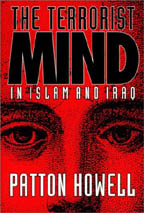 The
Terrorist Mind in Islam and Iraq — Patton Howell ’42
(Saybrook). Explores the relationship between Islam and terrorism
and the role that Westerners play in fostering its development.
Howell is a psychologist in Texas. The
Terrorist Mind in Islam and Iraq — Patton Howell ’42
(Saybrook). Explores the relationship between Islam and terrorism
and the role that Westerners play in fostering its development.
Howell is a psychologist in Texas.
And That’s the Way It Was in Jackson’s Hole — John S. Huyler ’42 (Jackson Hole Historical Society and Museum). A collection of stories about Jackson Hole, Wyoming, in the 1920s and ’30s. The book received the 2001 Wyoming State Historical Society Historical Award. Huyler was a teacher in California from 1949 until 1982 and now lives in Wyoming.
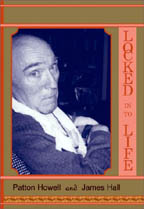 Locked
In To Life — Patton Howell ’42 and James Hall (Tea
Road). An account of the story of James Hall, victim of The Locked-in
Syndrome, which renders the body useless while the brain is fully
functional. Hall, with Howell’s help, learns to live without
his body. Howell is a forensic psychophysiologist. Locked
In To Life — Patton Howell ’42 and James Hall (Tea
Road). An account of the story of James Hall, victim of The Locked-in
Syndrome, which renders the body useless while the brain is fully
functional. Hall, with Howell’s help, learns to live without
his body. Howell is a forensic psychophysiologist.
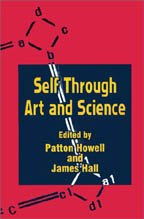 Self
Through Art and Science — edited by Patton Howell ’42
and James Hall (1st Books Library). This anthology explores the
edges of personal self in a time of diversity and change. Contributors
explore the changing convergence of science and art in a quest to
understand on what basis one excludes any human’s understanding
of whom he or she is. Howell is a psychophysiologist. Self
Through Art and Science — edited by Patton Howell ’42
and James Hall (1st Books Library). This anthology explores the
edges of personal self in a time of diversity and change. Contributors
explore the changing convergence of science and art in a quest to
understand on what basis one excludes any human’s understanding
of whom he or she is. Howell is a psychophysiologist.
The Meaning of Stroke: Mending the Mind — Patton Howell
’42 (Saybrook). This book discusses the experience of suffering
and recovering from a stroke. The healing process is as unique as
the trauma, argues Howell, who describes the step-by-step task of
rediscovering one’s mind. Howell is a forensic psychophysiologist
specializing in stroke and brain problems.
The Passionate Beechers: A Family Saga of Sanctity and Scandal
That Changed America — Samuel A. Schreiner Jr. ’42
(Wiley). Here biographer Samuel Schreiner tells the story of the
influential 19th-century Beecher family, including Harriet Beecher
Stowe, who wrote Uncle Tom’s Cabin, and her 10 siblings
— accomplished preachers, writers, soldiers, and crusaders
for social good. Schreiner lives in Darien, Connecticut.
1943
The Natural Bible for Modern and Future Man — John F. Brain
’43 (a.k.a. john F. Brinster.) (Hamilton Books). Brain
uses modern neuroscience to discuss the origin and practice of religions
around the world. Brain lives in Skillman, New Jersey.
The Notebook of a Native Washingtonian — Gilbert Hahn Jr.
’43 (Hamilton). Hahn, a Washington attorney for over 50
years, chronicles his social and political life in the District
of Columbia. Hahn is a senior partner at Amram & Hahn, P.C.
1944
The Story of Friends of Chatham Waterways: Decades of Dedication
— Robert D.B. Carlisle ’44 and Gordon Zellner (Friends
of Chatham Waterways). A collection of the initiatives, activities,
and achievements of the Friends of Chatham Waterways. Carlisle lives
in Chatham, Massachusetts.
 Lenabell:
A Doctor’s Memoir of a Remarkable Woman’s Eighty Year
Battle with Sickle Cell Disease — Hugh Chaplin ’44
(Xlibris). Chaplin discusses his patient of 45 years and the role
she played as an experimental subject for efforts to make sickle-cell
pain crises less frequent and less severe. Chaplin is an emeritus
professor of medicine and pathology at the Washington University
School of Medicine. Lenabell:
A Doctor’s Memoir of a Remarkable Woman’s Eighty Year
Battle with Sickle Cell Disease — Hugh Chaplin ’44
(Xlibris). Chaplin discusses his patient of 45 years and the role
she played as an experimental subject for efforts to make sickle-cell
pain crises less frequent and less severe. Chaplin is an emeritus
professor of medicine and pathology at the Washington University
School of Medicine.
Into the Abyss — Theodore Meth ’44 (Hang On To
Your Hat! Press). This book of poems covers a range of topics, from
the anxiety that comes with aging, to women, to bumper stickers.
Meth lives in Princeton, New Jersey.
1946
Winning Single Wing Football: A Simplified Guide for the Football Coach — Kenneth W. Keuffel ’46 (Swift Press). A guide for football coaches in applying winning techniques and strategies to the game. A college football star and a coach of several football teams, Keuffel lives in Lawrenceville, New Jersey.
Are You Really Free? Reflections on Christian Freedom —
Richard Stoll Armstrong ’46 (Fairway). Armstrong explains
his idea of what freedom really is and what Christian faith can
do to preserve it. Armstrong is a professor emeritus of ministry
and evangelism at Princeton Theological Seminary.
 The
Wright Brothers: Inventors of the Airplane — Bernard Ryan Jr.
’46 (Scholastic). Part of Scholastic’s “Great
Life Stories” series, Ryan’s book for children and young
adults gives a concise history of the airplane, the Wright Brothers,
and the results of their historic flight. The book also includes
a timeline and links to related Web sites. Ryan lives in Southbury,
Connecticut. The
Wright Brothers: Inventors of the Airplane — Bernard Ryan Jr.
’46 (Scholastic). Part of Scholastic’s “Great
Life Stories” series, Ryan’s book for children and young
adults gives a concise history of the airplane, the Wright Brothers,
and the results of their historic flight. The book also includes
a timeline and links to related Web sites. Ryan lives in Southbury,
Connecticut.
1947
 The
Gravest Danger: Nuclear Weapons — Sidney D. Drell ’47
and James E. Goodby (Hoover Institution). The authors review
policy issues surrounding the nonproliferation of nuclear weapons
and suggest actions that nations, under American leadership, should
take to contain and reduce the danger of nuclear weapons, such as
preventive military action. Drell is a professor emeritus of theoretical
physics at Stanford’s Linear Accelerator Center. The
Gravest Danger: Nuclear Weapons — Sidney D. Drell ’47
and James E. Goodby (Hoover Institution). The authors review
policy issues surrounding the nonproliferation of nuclear weapons
and suggest actions that nations, under American leadership, should
take to contain and reduce the danger of nuclear weapons, such as
preventive military action. Drell is a professor emeritus of theoretical
physics at Stanford’s Linear Accelerator Center.
Postponements: Memories of My Sister — Donold K. Lourie
’47 (Xlibris). Recounts the story of Lourie’s sister
Ann and her struggle with an incurable skin disease and the alcohol
and pharmaceutical drug addiction that resulted from it. Lourie
is an author living in Massachusetts.
1949
 Murphy’s
Law Repealed! Everything Turns Out Right … When You Let It—
Charles H. Ware’49 (Charlie’s Law)—The author
presents a self-help guide to finding happiness amid the turmoil
of everyday life through spiritually based techniques. Ware is the
creator of Charlie’s Law, Inc. Murphy’s
Law Repealed! Everything Turns Out Right … When You Let It—
Charles H. Ware’49 (Charlie’s Law)—The author
presents a self-help guide to finding happiness amid the turmoil
of everyday life through spiritually based techniques. Ware is the
creator of Charlie’s Law, Inc.
1950
Russia in Search of Itself — James H. Billington ’50 (Johns Hopkins). A survey of the efforts and changes made in Russia to re-establish a national identity in the post-Soviet era. Billington founded the Kennan Institute for Advanced Russian Studies in 1974, while acting as Director of the Woodrow Wilson International Center for Scholars. He has been the Librarian of Congress since 1987.
back to top
1951
Random Thoughts, Anecdotes, and Memories of a Boys’ Latin
School of Baltimore That Is No More—Don Hahn ’51 (Five
and Ten Press, Inc.). A memoir of Hahn’s 12 years (1935-1947)
as a student at the Boys’ Latin School of Maryland. Hahn lives
in Mendocino, California.
The Nunca Riddle: A Young Woman Proves Herself in the Amazon
Rain Forest — Wallace M. Kain ’51 (Inkberry Press).
This novel describes the adventures of high-schooler Jo Tartan as
she joins her parents for an expedition to the Peruvian Amazon to
search for the obscure Nunca people. During the trip, a lost Jo
encounters the Nuncas, learns to live with them, and fights against
their sure exploitation upon the arrival of the rest of the expedition.
This book is Kain’s first novel.
Hollywood: An Epic Production — William Park ’51
(Franklin Street Books). Park uses heroic couplets to recount and
interpret cinematic history. The book contains 12 short cantos;
each dedicated to a different film era, such as the Twenties or
Film Noir. Park is the coeditor of The College Anthology of English
and American Poetry and writes film reviews for the Position
Paper.
1952
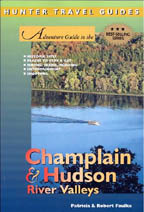 Adventure
Guide to the Champlain and Hudson River Valleys — Robert Foulke
’52 and Patricia Foulke (Hunter). A travel guide for the
250-mile corridor from New York City to Lake Champlain. The Foulkes
live in Lake George, N.Y. Adventure
Guide to the Champlain and Hudson River Valleys — Robert Foulke
’52 and Patricia Foulke (Hunter). A travel guide for the
250-mile corridor from New York City to Lake Champlain. The Foulkes
live in Lake George, N.Y.
Southern Excursions: Views on Southern Letters in My Time —
George Garrett ’52 *85, edited by James Conrad McKinley
(Louisiana). This compilation is a tribute to Garrett as writer,
editor, academic, and critic. Collected here are more than 50 of
his best interviews, essays, and reviews about Southern literature
and authors. Garrett is a professor of creative writing, emeritus,
at the University of Virginia. McKinley is a former student of Garrett’s.
1953
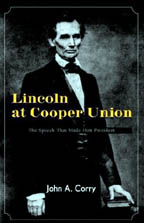 Lincoln
at Cooper Union: The Speech that Made Him President — John
A. Corry ’53 (Xlibris). Corry writes about the political
speech Abraham Lincoln made at New York’s Cooper Union on February
27, 1860, when he was still an Illinois lawyer. The book contains
previously unpublished background material and discusses why this
is the speech Lincoln claimed “made me President.” Corry
lives in New York. Lincoln
at Cooper Union: The Speech that Made Him President — John
A. Corry ’53 (Xlibris). Corry writes about the political
speech Abraham Lincoln made at New York’s Cooper Union on February
27, 1860, when he was still an Illinois lawyer. The book contains
previously unpublished background material and discusses why this
is the speech Lincoln claimed “made me President.” Corry
lives in New York.
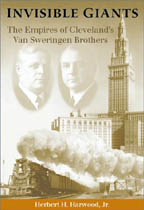 Invisible
Giants: The Empires of Cleveland’s Van Sweringen Brothers —
Herbert H. Harwood Jr. ’53 (Indiana University). Biography
of brothers Oris Paxton and Mantis James Van Sweringen, who were
wealthy and powerful industrialists in 1920s America. Harwood is
a railroad historian. Invisible
Giants: The Empires of Cleveland’s Van Sweringen Brothers —
Herbert H. Harwood Jr. ’53 (Indiana University). Biography
of brothers Oris Paxton and Mantis James Van Sweringen, who were
wealthy and powerful industrialists in 1920s America. Harwood is
a railroad historian.
A Genealogical Chart of Greek Mythology — compiled by Jon
O. Newman ’53 and Harold Newman (University of North Carolina).
This bound chart represents 3,673 Greek mythological figures in
a family tree that begins with Chaos and touches upon virtually
every figure ever mentioned in Greek mythology, spanning 20 generations.
All figures are referenced to an authoritative ancient text and
are supplemented with a brief description. Newman is a federal appellate
judge in New York City.
1954
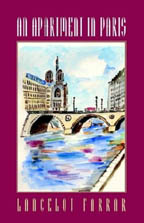 An
Apartment in Paris — Lancelot Farrar ’54 (Farrar).
This memoir recounts a year the author spent in Paris with his wife
and daughter in 1980. In writing about his daily life, Farrar discusses
such topics as the challenges of working in Paris, his bemused frustrations
of the French language, and his family’s relations with local
shopkeepers. Farrar is also the author of several books on German
strategy and policy before and during World War I. An
Apartment in Paris — Lancelot Farrar ’54 (Farrar).
This memoir recounts a year the author spent in Paris with his wife
and daughter in 1980. In writing about his daily life, Farrar discusses
such topics as the challenges of working in Paris, his bemused frustrations
of the French language, and his family’s relations with local
shopkeepers. Farrar is also the author of several books on German
strategy and policy before and during World War I.
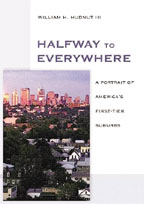 Halfway
to Everywhere: A Portrait of America’s First-Tier Suburbs —
William H. Hudnut III ’54 (Urban Land Institute). The author
looks at the country’s first suburbs, built through the middle
of the 20th century, which are experiencing urban-like problems,
including aging infrastructure, population decline, crime, and increasing
poverty. In a series of case studies Hudnut examines how these suburbs
were born, declined, and can be revitalized. A former mayor of Indianapolis,
Hudnut is a senior resident fellow at the Urban Land Institute. Halfway
to Everywhere: A Portrait of America’s First-Tier Suburbs —
William H. Hudnut III ’54 (Urban Land Institute). The author
looks at the country’s first suburbs, built through the middle
of the 20th century, which are experiencing urban-like problems,
including aging infrastructure, population decline, crime, and increasing
poverty. In a series of case studies Hudnut examines how these suburbs
were born, declined, and can be revitalized. A former mayor of Indianapolis,
Hudnut is a senior resident fellow at the Urban Land Institute.
1955
A View of the World’s Medical Schools— Markley H.
Boyer ’55 and Dr. Charles Boelen (published
online). This report, based on data gathered by the World Health
Organization, provides information on admissions, curricula, teaching,
community involvement, faculty, and students at the medical schools
surveyed, as well as observations about the role of medical schools
in the world and their influence on public health. Boyer is a professor
of family medicine and community health at Tufts School of Medicine.
Selling Sin: The Marketing of Socially Unacceptable Products
(Second Edition) — D. Kirk Davidson ’55 (Praeger).
Davidson explores the problems that marketers face in working with
cigarettes, alcoholic beverages, firearms, gambling, and pornography.
This second edition includes a new chapter on the specific problems
of online marketing. Davidson is an associate professor and chair
of the Department of Business, Accounting, and Economics at Mount
Saint Mary’s College.
1956
 Sermons
That Shaped America: Reformed Preaching from 1630 to 2001 —
edited by William S. Barker ’56 and Samuel T. Logan Jr. ’65
(P & R). A collection of 18 sermons in American history,
including those by John Winthrop, Cotton Mather, Archibald Alexander,
and Timothy Keller. Barker is professor of church history emeritus
at Westminster Theological Seminary. Logan is professor of church
history and president of Westminster Theological Seminary. Sermons
That Shaped America: Reformed Preaching from 1630 to 2001 —
edited by William S. Barker ’56 and Samuel T. Logan Jr. ’65
(P & R). A collection of 18 sermons in American history,
including those by John Winthrop, Cotton Mather, Archibald Alexander,
and Timothy Keller. Barker is professor of church history emeritus
at Westminster Theological Seminary. Logan is professor of church
history and president of Westminster Theological Seminary.
Safe Harbor: Exploring Maine’s Sheltered Bays, Coves, and
Anchorages — by William Hubbell ’56 (Down East Books).
Hubbell spent 15 months exploring Maine’s islands, inlets,
coves, bays, and harbors, and talking to residents, fishing with
lobstermen, and cruising with yachtsmen. A coffee-table book full
of Hubbell’s beautiful color photographs, Safe Harbor is the
result. Hubbell is a photographer from Cumberland Foreside, Maine.
1957
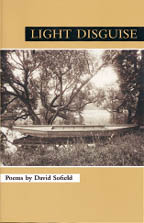 Light
Disguise — David Sofield ’57 (Copper Beech). In Sofield’s
first book of poems, written over the last 30 years, he covers a
range of topics, from the parallels between cleaning up one’s
desk and one’s life, to feelings of hopelessness and elation,
to turning 65 in Vienna. Sofield is an English professor at Amherst
College. His work has been published in the New Yorker, Poetry,
and the New Republic. Light
Disguise — David Sofield ’57 (Copper Beech). In Sofield’s
first book of poems, written over the last 30 years, he covers a
range of topics, from the parallels between cleaning up one’s
desk and one’s life, to feelings of hopelessness and elation,
to turning 65 in Vienna. Sofield is an English professor at Amherst
College. His work has been published in the New Yorker, Poetry,
and the New Republic.
1958
Learning the Angels — Rennie McQuilkin ’58 (Antrim
House). The author’s fifth volume of poetry explores love.
McQuilkin was director of the Sunken Garden Poetry Festival and
lives in Connecticut.
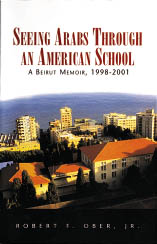 Seeing
Arabs Through an American School: A Beirut Memoir, 1998-2001 —
Robert F. Ober Jr. ’58. (Xlibris). A memoir of the author’s
stint as president of an American independent school, International
College, in Beirut, Lebanon, serving 3,500 Arab students from preschool
through high school. Ober also discusses the challenges he faced
leading a secular school in a non-secular nation. Ober served in
the U.S. Foreign Service until 1987. Seeing
Arabs Through an American School: A Beirut Memoir, 1998-2001 —
Robert F. Ober Jr. ’58. (Xlibris). A memoir of the author’s
stint as president of an American independent school, International
College, in Beirut, Lebanon, serving 3,500 Arab students from preschool
through high school. Ober also discusses the challenges he faced
leading a secular school in a non-secular nation. Ober served in
the U.S. Foreign Service until 1987.
1959
Lessons Learned: Shaping Relationships and the Culture of the
Workplace — Roland S. Barth ’59 (Corwin). Uses experiences
in sailing to develop a strategy for a successful work environment.
Barth is a consultant to educational establishments and businesses.
The Essential Guide to Electronic Design Automation (EDA)—Mark
D. Birnbaum ’59 (Prentice Hall). An informal introduction
to EDA business and technology written for both laypeople and technical
readers. The book introduces design problems EDA is intended to
solve, tools that exist to solve them, designers who use them, and
what makes EDA crucial to electronic product and chip design. Birnbaum
has worked at nine major computer, semiconductor, EDA, and research
organizations.
A Melancholy Affair at the Weldon Railroad: June 23, 1864 —
David Faris Cross ’59 (White Mane). This book explores
what went wrong for the Vermont Brigade of the Army of the Potomac
during its major loss at the Weldon Railroad in Virginia, during
the last year of the Civil War. Cross uses the Weldon Railroad experience
to discuss the problems confronting Ulysses S. Grant toward the
end of the Civil War. Cross is a recently retired physician and
founding member of the Green Mountain Civil War Roundtable.
A Fashionable Tour Through the Great Lakes and Upper Mississippi: The 1852 Journal of Juliette Starr Dana — David T. Dana III ’59 (Wayne State University). A daily journal of a 35-year-old mother and wife during her tour over 3,000 miles of the United States in 1852. Dana is a retired corporate lawyer and adjunct professor of law and legal writing.
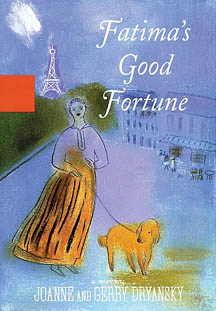 Fatima’s
Good Fortune — Joanne and Gerry Dryansky ’59 (Miramax).This
husband-and-wife team’s contemporary novel is built around
the life of a Tunisian maid, Fatima, who is summoned to Paris when
her sister, the maid to an exacting countess, dies. At first, Fatima
finds herself baffled by her new life, but soon her luck changes.
Gerry Dryansky is the European editor of Condé Nast Traveler,
based in Paris. Joanne Dryansky is a screenwriter. Fatima’s
Good Fortune — Joanne and Gerry Dryansky ’59 (Miramax).This
husband-and-wife team’s contemporary novel is built around
the life of a Tunisian maid, Fatima, who is summoned to Paris when
her sister, the maid to an exacting countess, dies. At first, Fatima
finds herself baffled by her new life, but soon her luck changes.
Gerry Dryansky is the European editor of Condé Nast Traveler,
based in Paris. Joanne Dryansky is a screenwriter.
It’s Dimensional — William A. Kelly ’49 (Xlibris).
Aimed at students in 8th grade through college, this book teaches
how to use dimensional analysis to solve word problems. Kelly lives
in Haworth, New Jersey.
back to top
1960
Directing Shakespeare: A Scholar Onstage — Sidney Homan
’60 (Ohio). Homan discusses the mechanics of acting, staging,
and directing Shakespeare’s plays, as well as his personal
experiences as a director and actor. Homan is a professor of English
at the University of Florida.
France — Stephen C. Jett ’60 (Chelsea House). A description of the history, geography, government, economy, people and culture of France, illustrated with pictures and statistics. Jett is a professor emeritus in the Textiles and Clothing Division at the University of California.
Rein In at the Brink of the Precipice: American Policy Toward
Taiwan and U.S.-PRC Relations — Alan D. Romberg ’60
(Henry L. Stimson Center). Romberg argues that, inattentive to the
history and the nuances of “normalization” of U.S. relations
with Taiwan, American leaders have generated unintended crises,
and may do so again in the future. Romberg is a senior associate
at the Henry L. Stimson Center in Washington, D.C.
1961
No Sword to Bury: Japanese Americans in Hawaii during World War II — Franklin Odo ’61 *75 (Temple). A demystifying look into the wartime experience of first generation Japanese Americans, the context of the formation of a new community and a new ethnical identity. Odo is director of the Smithsonian Asian Pacific American Program and editor of The Columbia Documentary History of the Asian American Experience.
1963
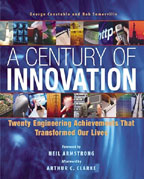 A
Century of Innovation: Twenty Engineering Achievements that Transformed
Our Lives — George Constable ’63 and Bob Somerville ’78
(Joseph Henry). A Century of Innovation profiles what the authors
consider the most significant inventions, including electricity,
the automobile, and the Internet. For each item, the authors give
a history, an illustrated explanation of how it works, and a timeline
tracing its evolution. Constable is a freelance writer and editor.
Somerville, also a freelancer, worked for 20 years at Time-Life
Books. A
Century of Innovation: Twenty Engineering Achievements that Transformed
Our Lives — George Constable ’63 and Bob Somerville ’78
(Joseph Henry). A Century of Innovation profiles what the authors
consider the most significant inventions, including electricity,
the automobile, and the Internet. For each item, the authors give
a history, an illustrated explanation of how it works, and a timeline
tracing its evolution. Constable is a freelance writer and editor.
Somerville, also a freelancer, worked for 20 years at Time-Life
Books.
Lean Enterprise Value: Insights from MIT’s Lean Aerospace
Initiative — coauthored by Earll Murman ’63 *67 (Palgrave).
Provides a new agenda for the aerospace industry and redefines and
develops the concept of Lean as a framework for enterprise transformation.
Murman is a professor of aeronautics and astronautics and program
director of the Lean Aerospace Initiative at M.I.T.
 Restructuring
Sovereign Debt: The Case for Ad Hoc Machinery — Lex Rieffel
’63 (Brookings Institution). This book tells how the London
Club originated for the first time, highlighting the pragmatic and
flexible appeal of ad hoc approaches. Rieffel also discusses earlier
proposals for permanent debt restructuring and the reasons they
were not adopted. Rieffel served 18 years with the U.S. Treasury
Department and is currently teaching, consulting, and writing. Restructuring
Sovereign Debt: The Case for Ad Hoc Machinery — Lex Rieffel
’63 (Brookings Institution). This book tells how the London
Club originated for the first time, highlighting the pragmatic and
flexible appeal of ad hoc approaches. Rieffel also discusses earlier
proposals for permanent debt restructuring and the reasons they
were not adopted. Rieffel served 18 years with the U.S. Treasury
Department and is currently teaching, consulting, and writing.
1963
Love Is Not A Game (But You Should Know the Odds) — Randy
Hurlburt ’63 *65 and Harold Bessell (Personhood Press).
Hurlburt discusses why good love and good sex is so hard to find
and what to do about it. He intersperses stories of real relationships
with analysis of the primary ingredients of true love and the secrets
to finding such love. And he offers strategies to overcome the obstacles
to finding true love. Hurlburt lives in San Diego.
1964
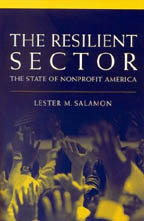 The
Resilient Sector: The State of Nonprofit America — Lester M.
Salamon ’64 (Brookings). An update of The State of Nonprofit
America (2002), this book is an assessment of America’s nonprofit
sector. Salamon argues that business-like approaches are putting
nonprofits at risk and that market pressures hurt the values that
make nonprofits important. Salamon is the director of the Johns
Hopkins Center for Civil Society Studies. The
Resilient Sector: The State of Nonprofit America — Lester M.
Salamon ’64 (Brookings). An update of The State of Nonprofit
America (2002), this book is an assessment of America’s nonprofit
sector. Salamon argues that business-like approaches are putting
nonprofits at risk and that market pressures hurt the values that
make nonprofits important. Salamon is the director of the Johns
Hopkins Center for Civil Society Studies.
1965
 Sermons
That Shaped America: Reformed Preaching from 1630 to 2001 —
edited by William S. Barker ’56 and Samuel T. Logan Jr. ’65
(P & R). A collection of 18 sermons in American history,
including those by John Winthrop, Cotton Mather, Archibald Alexander,
and Timothy Keller. Barker is professor of church history emeritus
at Westminster Theological Seminary. Logan is professor of church
history and president of Westminster Theological Seminary. Sermons
That Shaped America: Reformed Preaching from 1630 to 2001 —
edited by William S. Barker ’56 and Samuel T. Logan Jr. ’65
(P & R). A collection of 18 sermons in American history,
including those by John Winthrop, Cotton Mather, Archibald Alexander,
and Timothy Keller. Barker is professor of church history emeritus
at Westminster Theological Seminary. Logan is professor of church
history and president of Westminster Theological Seminary.
Back From the Brink: How Crises Spur Doctors to New Discoveries about the Brain — Edward J. Sylvester ’65 (Dana). An inside look at the world of brain surgery through stories and testimonies of patients and doctors. Sylvester is a journalism professor at Arizona State University’s Walter Cronkite School of Journalism and Mass Communication.
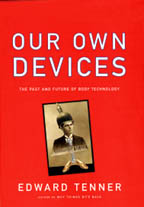
Our Own Devices: The Past and Future of Body Technology —
Edward Tenner ’65 (Knopf). As he did in his previous book,
Why Things Bite Back (1996), Tenner looks at the unintended consequences
of innovations, focusing on what he calls body technologies —
baby formula, sandals, chairs, eyeglasses, helmets, keyboards —
everyday things that affect how people use their bodies. The use
of chairs, for example, has damaged our body’s natural flexibility.
Tenner is a senior research associate on invention and innovation
at the National Museum of American History in Washington, D.C.
Steam Locomotives: Whistling, Chugging, Smoking Iron Horses
of the Past — Karl Zimmermann ’65 (Boyds Mills Press).
This railroad history for young readers traces the development of
steam locomotives and explains how they work. Zimmermann written
or coauthored 15 books about trains.
1966
 William
Clark and the Shaping of the West — Landon Y. Jones ’66
(Hill and Wang). Jones tells the story of William Clark, made famous
for his 1804 expedition with Meriwether Lewis. Jones traces Clark’s
life from his childhood in Virginia to his controversial efforts
to reconcile the interests of the federal government, western settlers,
and Native Americans some 30 years after his famous expedition.
Jones is a board member of the National Council of the Lewis and
Clark Bicentennial. William
Clark and the Shaping of the West — Landon Y. Jones ’66
(Hill and Wang). Jones tells the story of William Clark, made famous
for his 1804 expedition with Meriwether Lewis. Jones traces Clark’s
life from his childhood in Virginia to his controversial efforts
to reconcile the interests of the federal government, western settlers,
and Native Americans some 30 years after his famous expedition.
Jones is a board member of the National Council of the Lewis and
Clark Bicentennial.
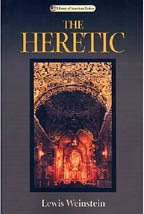 The
Heretic — Lewis Weinstein ’66 (University of Wisconsin).
A historical novel about a secretly Jewish family in Inquisition
Spain. This paperback edition contains a new afterword by the author.
Weinstein is a writer and businessman living in Manhattan and Ocean
City, NJ. The
Heretic — Lewis Weinstein ’66 (University of Wisconsin).
A historical novel about a secretly Jewish family in Inquisition
Spain. This paperback edition contains a new afterword by the author.
Weinstein is a writer and businessman living in Manhattan and Ocean
City, NJ.
1968
Psychosocial Treatment for Medical Conditions: Principles and
Techniques — edited by Harold S. Bernard ’68, Leon
A. Schein, Henry I. Spitz, Philip R. Muskin (Routledge). An up-to-date
reference for the diagnosis and treatment of the psychological and
psychosocial sequelae that accompany major illness. Bernard is a
clinical associate professor of psychiatry at New York University
School of Medicine.
The New Rapture (Meditations on Virida Gray) — Michael
Dusenberry ’68 (Xlibris). Published posthumously, this
volume of poetry is Dusenberry’s adaptation of his friend Peter
Baillie’s journal entries about a woman, Virida Gray. Dusenberry
was a computer programmer and was a member of the Santa Cruz Poet
Society and Writers Guild.
Blood Brothers — David Gould ’68 and Sol Wachtler
(New Millennium). This novel chronicles the unlikely friendship
between Luke Lipton, a Jew, and T.C. Simmons, a future Ku Klux Klan
member, who in their youth were blood brothers. But as they grow
they separate until years later when Lipton, a lawyer, must defend
Simmons in a lynching case. Gould is an attorney in Port Washington,
NY.
Astronomy: A Physical Perspective — Marc L. Kutner ’68
(Cambridge). In this revised and updated second edition, Kutner
gives an introduction to astronomical objects and phenomena such
as black holes, the structure of the universe, the nature of galaxies,
and the possibility of finding other planetary systems. Kutner is
a visiting scientist in the Department of Astronomy at the University
of Texas at Austin.
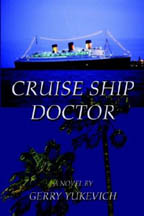 Cruise
Ship Doctor — Gerry Yukevich ’68 (Publish America).
This novel tells the tale of Oliver Loring, M.D., a Harvard emergency
physician, amorous bachelor, and expert ballroom dancer, who takes
a job in the Caribbean on the legendary cruise ship the S/S Nordic
Blue during its weeklong “Valentine TV Cruise.” Yukevich
practices emergency medicine in Martha’s Vineyard. Cruise
Ship Doctor — Gerry Yukevich ’68 (Publish America).
This novel tells the tale of Oliver Loring, M.D., a Harvard emergency
physician, amorous bachelor, and expert ballroom dancer, who takes
a job in the Caribbean on the legendary cruise ship the S/S Nordic
Blue during its weeklong “Valentine TV Cruise.” Yukevich
practices emergency medicine in Martha’s Vineyard.
back to top
1970
 San
Francisco Bay: Portrait of an Estuary — John Hart ’70,
photographs by David Sanger (California). Hart explores San Francisco
Bay’s history, including its ecology and urban and industrial
development. The bay, with an inland delta, is one of the largest
estuaries in the Americas and one of the most degraded. The book
describes the local movement to save the bay. Hart is an editor
for the literary magazine Blue Unicorn. San
Francisco Bay: Portrait of an Estuary — John Hart ’70,
photographs by David Sanger (California). Hart explores San Francisco
Bay’s history, including its ecology and urban and industrial
development. The bay, with an inland delta, is one of the largest
estuaries in the Americas and one of the most degraded. The book
describes the local movement to save the bay. Hart is an editor
for the literary magazine Blue Unicorn.
Race War!: White Supremacy & the Japanese Attack on the
British Empire — Gerald Horne ’70 (N.Y.U. Press).
Through archival research on five continents, Horne provides a sweeping
new interpretation of the Pacific War and how and why “white
supremacy” began to retreat after 1945. Horne is a professor
of African and Afro-American studies at the University of North
Carolina-Chapel Hill.
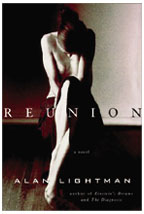 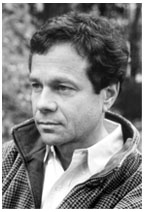 Reunion
— Alan Lightman ’70 (at right) (Pantheon). In Reunion,
Lightman’s fourth novel, he tells the story of Charles, Class
of 1969 at an all-male East Coast college that resembles Princeton,
and Juliana, a beautiful and driven New York ballet dancer Charles
met in a coffee shop. More. Reunion
— Alan Lightman ’70 (at right) (Pantheon). In Reunion,
Lightman’s fourth novel, he tells the story of Charles, Class
of 1969 at an all-male East Coast college that resembles Princeton,
and Juliana, a beautiful and driven New York ballet dancer Charles
met in a coffee shop. More.
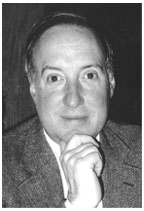 Beyond
the Front Lines: How the News Media Cover a World Shaped by War
— Philip Seib ’70 (Palgrave Macmillan). Seib (left)
analyzes the performance of news media in Iraq and elsewhere and
offers solutions for providing more balanced, independent news during
wartime. Seib is the Lucius W. Nieman Professor of Journalism at
Marquette University. Beyond
the Front Lines: How the News Media Cover a World Shaped by War
— Philip Seib ’70 (Palgrave Macmillan). Seib (left)
analyzes the performance of news media in Iraq and elsewhere and
offers solutions for providing more balanced, independent news during
wartime. Seib is the Lucius W. Nieman Professor of Journalism at
Marquette University.
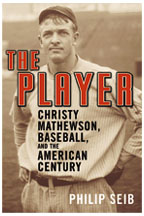 The
Player: Christy Mathewson, Baseball and the American Century —
Philip Seib ’70 (Four Walls Eight Windows). Philip Seib
’70 (left) resurrects New York Giants pitcher Christy Mathewson.
More. The
Player: Christy Mathewson, Baseball and the American Century —
Philip Seib ’70 (Four Walls Eight Windows). Philip Seib
’70 (left) resurrects New York Giants pitcher Christy Mathewson.
More.
An English Translation of Léon-Paul Fargue’s Poëmes
— translated by Peter S. Thompson ’70 (Edwin Mellen
Press). Thompson translates the first major collection of Fargue’s
poetry in America. Fargue’s prose poetry serves as commentary
of the 1920s and ’30s, describing late night prowls of Paris’
streets and alleys. Thompson teaches at Roger Williams University.
1971
Kate Remembered — A. Scott Berg ’71 (Putnam).
Both biography and memoir, this book is told by the man Katharine
Hepburn chose as her chronicler and who became her close friend
during the last two decades of her life. Kate Remembered revisits
Hepburn’s career as an actress and as an icon for the American
woman, and includes details about her relationships with Spencer
Tracy and Howard Hughes. Berg won the Pulitzer Prize for his biography
Lindbergh (1998).
Fire & Ice: Nine Poets from Scandinavia and the North —
edited by Gordon Walmsley ’71 (Salmon Publishing). A collection
of Swedish, Danish, Norwegian, and Icelandic poets in English translation,
including works by such poets as Katarina Frostenson, Didda, and
Lene Henningsen. Walmsley is a poet in Copenhagen.
1972
Robert Ball and the Politics of Social Security — Edward
D. Berkowitz ’72 (University of Wisconsin). Berkowitz presents
a biography of Robert Ball, a key player in Social Security and
Medicare development, in which he demonstrates how Ball used the
conservative means of social insurance toward the liberal end of
expanding the welfare state. Berkowitz is professor of history and
director of the Program in History and Public Policy at George Washington
University.
 Who
Owns Native Culture? — Michael F. Brown ’72 (Harvard).
This book introduces the question of cultural ownership through
discussion of several cases in which indigenous populations have
confronted settlers over the usurpation of their cultural heritage.
Brown is a professor of anthropology and Latin American studies
at Williams College. Who
Owns Native Culture? — Michael F. Brown ’72 (Harvard).
This book introduces the question of cultural ownership through
discussion of several cases in which indigenous populations have
confronted settlers over the usurpation of their cultural heritage.
Brown is a professor of anthropology and Latin American studies
at Williams College.
Identifying and Managing Project Risk: Essential Tools for Failure-Proofing
Your Project — Tom Kendrick ’72 (Amacom). Using the
construction of the Panama Canal as the template for a successful
project, this book outlines the principles of project risk management.
Kendrick is a program manager for Hewlett Packard.
Bridging the Gap: Connecting What You Learned in Seminary with
What You Find in the Congregation — Charles J. Scalise ’72
(Abingdon Press). In this book aimed at pastors, Scalise discusses
ways to bridge the gap between theological reflection learned in
academic settings and the practice of ministry in a church. Scalise
is a professor of church history at Fuller Theological Seminary
Northwest.
Spiritual Warrior IV: Conquering the Enemies of the Mind —
B.T. Swami (John E. Favors) ’72 (Hari-Nama). This guide
provides an approach to dealing with depression, anxiety, anger,
and grief. Spiritual Warrior V: Making the Mind Your Best Friend
— B.T. SWAMI (JOHN E. FAVORS) ’72 (Hari-Nama). This book
describes how one can develop a more positive internal dialogue
and thus become a successful “spiritual warrior.” B.T.
Swami is the author of other books on spiritual topics.
1973
Madison’s Descent: A Child’s Journey — Page Allen ’73 (Owings-Dewey Fine Art). An illustrated book for both children and adults that follows a baby girl’s fantastical journey on her way to be born. Page is a visual artist and writer whose tale was inspired by the birth of her niece. She is currently working on a multi-disciplinary theatrical adaptation of her work.
1975
The Kindness of Strangers — edited by Don George ’75
(Lonely Planet). A collection of 26 essays by travel writers
about strangers who helped them when they were on the road. The
contributors include well-known writers — such as Pico Iyer,
who describes a scrawny pedicab peddler in Mandalay, Myanmar, who
gave Iyer a piece of jade to remember him by — as well as previously
unpublished authors. Varied in tone and locale, the stories explore
unexpected human connections. George is global travel editor for
Lonely Planet Publications.
1976
A Christian Approach to Overcoming Disability: A Doctor’s
Story — Elaine Leong Eng ’76 (Haworth Press). Eng
recounts the changes in her life as she received a diagnosis of
impending blindness. Switching careers from obstetrics and gynecology
to psychiatry, Eng discusses how her Christian faith has helped
her cope. Eng is a clinical assistant professor of psychiatry in
the Department of Obstetrics and Gynecology at Cornell-Weill Medical
College.
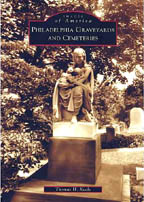 Images
of America: Philadelphia Graveyards and Cemeteries — Thomas
H. Keels ’76 (Arcadia). As part of an Images of America
series, Keels explores the final resting places of different social
and cultural groups and points out how differences in beliefs and
lifestyle are often reflected in burial practices and monument designs.
The book includes more than 200 photographs of sites. Keels is a
writer and historian living in Lafayette Hill, Pa. Images
of America: Philadelphia Graveyards and Cemeteries — Thomas
H. Keels ’76 (Arcadia). As part of an Images of America
series, Keels explores the final resting places of different social
and cultural groups and points out how differences in beliefs and
lifestyle are often reflected in burial practices and monument designs.
The book includes more than 200 photographs of sites. Keels is a
writer and historian living in Lafayette Hill, Pa.
Swifter, Higher, Stronger: A Photographic History of the Summer
Olympics — Sue Macy ’76 (National Geographic). Aimed
at ages 10 and up, Macy writes an account of the modern Olympic
Games. The book includes athletic biographies, photos of Olympic
stars in action, and an Olympic Almanac that includes statistics,
a map of the Summer Olympic sites, and highlights from each Summer
Olympiad. Macy lives in Englewood, New Jersey.
Rogue — Wes Swain ’76 (Xlibris). First-time novelist
Swain writes of Dr. Colleen Brennan, the director of a marine mammal
rescue and research center. When Brennan is called to investigate
the deaths of six dolphins in Ocean City, New Jersey, she finds
herself confronted with a rival marine biologist, an ambitious college
professor, and a retired Navy dolphin trainer, all of whom have
a personal interest in the dead dolphins. Swain is a municipal administrator
in southern New Jersey.
1977
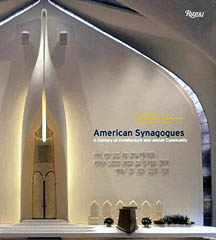 American
Synagogues: A Century of Architecture and Jewish Community —
Samuel D. Gruber ’77 (Rizzoli). In this survey of 20th-century
American synagogues, Gruber explores how the history of the Jewish
people is expressed in synagogue design. The author looks at 35
houses of worship, including Beth Sholom Synagogue in Elkins Park,
Pennsylvania, designed by Frank Lloyd Wright in 1957. Color photos
by Paul Rocheleau accompany the text. Gruber teaches in the Judaic
studies program at Syracuse University and is president of the International
Survey of Jewish Monuments. American
Synagogues: A Century of Architecture and Jewish Community —
Samuel D. Gruber ’77 (Rizzoli). In this survey of 20th-century
American synagogues, Gruber explores how the history of the Jewish
people is expressed in synagogue design. The author looks at 35
houses of worship, including Beth Sholom Synagogue in Elkins Park,
Pennsylvania, designed by Frank Lloyd Wright in 1957. Color photos
by Paul Rocheleau accompany the text. Gruber teaches in the Judaic
studies program at Syracuse University and is president of the International
Survey of Jewish Monuments.
Business Statistics Demystified — Steven M. Kemp ’77 and Sid Kemp(McGraw Hill). A self-study guide to statistics, targeted primarily to business students taking a statistics course. Kemp is a research faculty member in the psychology department at the University of North Carolina.
1978
First Steps in Linear Algebra —Jesse Deutsch ’78 and
Jean-Baptist Gatsinzi (Bay Publishing). An elementary introduction
to linear algebra, this book emphasizes matrix computation for mathematicians,
engineers, and social scientists. Deutsch is a professor at the
University of Botswana.
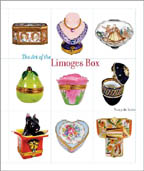 The
Art of the Limoges Box — Nancy du Tertre ’78 (Abrams).
A designer of Limoges boxes, du Tertre traces the Limoges lineage
from snuffboxes to vessels for love notes to collector’s items.
For collectors, she also includes tips on finding the best boxes.
Du Tertre is part-owner of the manufacturer Artoria Limoges in Limoges,
France. The
Art of the Limoges Box — Nancy du Tertre ’78 (Abrams).
A designer of Limoges boxes, du Tertre traces the Limoges lineage
from snuffboxes to vessels for love notes to collector’s items.
For collectors, she also includes tips on finding the best boxes.
Du Tertre is part-owner of the manufacturer Artoria Limoges in Limoges,
France.
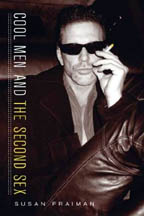 Cool
Men and the Second Sex — Susan Fraiman ’78 (Columbia).
In this feminist critique, Fraiman defines “cool men”
as those who rebel against a mainstream defined as maternal. She
cites such figures as Henry Louis Gates Jr. and Quentin Tarantino
as examples of men who resist the authority of women and, as a result,
ignore the thoughts of feminist thinkers, sometimes devaluing women
in favor of men and masculinity. Fraiman is an English professor
at the University of Virginia. Cool
Men and the Second Sex — Susan Fraiman ’78 (Columbia).
In this feminist critique, Fraiman defines “cool men”
as those who rebel against a mainstream defined as maternal. She
cites such figures as Henry Louis Gates Jr. and Quentin Tarantino
as examples of men who resist the authority of women and, as a result,
ignore the thoughts of feminist thinkers, sometimes devaluing women
in favor of men and masculinity. Fraiman is an English professor
at the University of Virginia.
 The
Edge of Surrealism: A Roger Caillois Reader — edited by Claudine
Frank ’78 (Duke). Comprehensive collection of the writings
of Roger Caillois, a French social theorist who focused on modern
intellectual life and Surrealism. The editor’s introductory
essay serves to situate Caillois’ writings intellectually and
historically. Frank is an assistant professor of French at Barnard
College. The
Edge of Surrealism: A Roger Caillois Reader — edited by Claudine
Frank ’78 (Duke). Comprehensive collection of the writings
of Roger Caillois, a French social theorist who focused on modern
intellectual life and Surrealism. The editor’s introductory
essay serves to situate Caillois’ writings intellectually and
historically. Frank is an assistant professor of French at Barnard
College.
 A
Century of Innovation: Twenty Engineering Achievements that Transformed
Our Lives — George Constable ’63 and Bob Somerville ’78
(Joseph Henry). A Century of Innovation profiles what the authors
consider the most significant inventions, including electricity,
the automobile, and the Internet. For each item, the authors give
a history, an illustrated explanation of how it works, and a timeline
tracing its evolution. Constable is a freelance writer and editor.
Somerville, also a freelancer, worked for 20 years at Time-Life
Books. A
Century of Innovation: Twenty Engineering Achievements that Transformed
Our Lives — George Constable ’63 and Bob Somerville ’78
(Joseph Henry). A Century of Innovation profiles what the authors
consider the most significant inventions, including electricity,
the automobile, and the Internet. For each item, the authors give
a history, an illustrated explanation of how it works, and a timeline
tracing its evolution. Constable is a freelance writer and editor.
Somerville, also a freelancer, worked for 20 years at Time-Life
Books.
1979
 Separation
of Church and State — Philip Hamburger ’79 (Harvard).
Hamburger argues that the separation of church and state has no
historical foundation in the First Amendment. Although Thomas Jefferson
and others retrospectively claimed that the First Amendment separated
church and state, separation became part of American constitutional
law only much later. Hamburger is John P. Wilson Professor of Law
at the University of Chicago. Separation
of Church and State — Philip Hamburger ’79 (Harvard).
Hamburger argues that the separation of church and state has no
historical foundation in the First Amendment. Although Thomas Jefferson
and others retrospectively claimed that the First Amendment separated
church and state, separation became part of American constitutional
law only much later. Hamburger is John P. Wilson Professor of Law
at the University of Chicago.
 A
Season in Bethlehem: Unholy War in a Sacred Place — Joshua
Hammer ’79 ( Free Press). Hammer, in his second nonfiction
book — introduces 21 real-life dramatis personae caught up
in the Israeli-Palestinian conflict. His aim: to go deeper than
the day-to-day violence he was covering as Newsweek’s
Jerusalem-based Middle East bureau chief. The book is mainly a reconstruction
of events, pieced together from interviews conducted in the summer
and fall of 2002 after a U.S.-European-brokered compromise ended
a 39-day standoff between Palestinian gunmen and Israeli soldiers
at Bethlehem’s Church of the Nativity.
More. A
Season in Bethlehem: Unholy War in a Sacred Place — Joshua
Hammer ’79 ( Free Press). Hammer, in his second nonfiction
book — introduces 21 real-life dramatis personae caught up
in the Israeli-Palestinian conflict. His aim: to go deeper than
the day-to-day violence he was covering as Newsweek’s
Jerusalem-based Middle East bureau chief. The book is mainly a reconstruction
of events, pieced together from interviews conducted in the summer
and fall of 2002 after a U.S.-European-brokered compromise ended
a 39-day standoff between Palestinian gunmen and Israeli soldiers
at Bethlehem’s Church of the Nativity.
More.
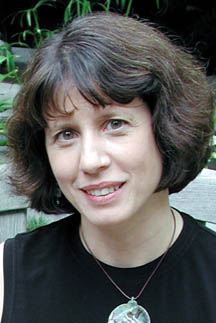 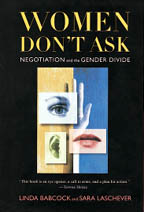 Women
Don’t Ask: Negotiation and the Gender Divide — Sara Laschever
’79 (Princeton). Laschever, a journalist from Somerville,
Massachusetts, and coauthor Linda Babcock, an economist at Carnegie
Mellon University, examine the societal and personal reasons that
many women are averse to negotiating on their own behalf and fail
to realize that certain situations are negotiable at all. The results
of this phenomenon are stark, according to the authors: Women who
fail to negotiate for their initial salary can lose hundreds of
thousands of dollars over the course of a lifetime. More. Women
Don’t Ask: Negotiation and the Gender Divide — Sara Laschever
’79 (Princeton). Laschever, a journalist from Somerville,
Massachusetts, and coauthor Linda Babcock, an economist at Carnegie
Mellon University, examine the societal and personal reasons that
many women are averse to negotiating on their own behalf and fail
to realize that certain situations are negotiable at all. The results
of this phenomenon are stark, according to the authors: Women who
fail to negotiate for their initial salary can lose hundreds of
thousands of dollars over the course of a lifetime. More.
back to top
1980
 In
Praise of Nepotism: A Natural History — Adam Bellow ’80
(Doubleday). In his first book, Bellow delivers a straight history
of nepotistic practices through the ages, from King David’s
vow in the 10th century B.C.E. that the son of his wife, Bathsheba,
would succeed him, to Joseph Kennedy’s machinations on behalf
of his sons’ careers. But Bellow’s central thesis is that
a “new nepotism” is on the rise in American public life
and that this may help to balance our excessive faith in the concept
of pure meritocracy. More. In
Praise of Nepotism: A Natural History — Adam Bellow ’80
(Doubleday). In his first book, Bellow delivers a straight history
of nepotistic practices through the ages, from King David’s
vow in the 10th century B.C.E. that the son of his wife, Bathsheba,
would succeed him, to Joseph Kennedy’s machinations on behalf
of his sons’ careers. But Bellow’s central thesis is that
a “new nepotism” is on the rise in American public life
and that this may help to balance our excessive faith in the concept
of pure meritocracy. More.
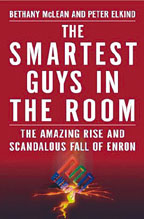 The
Smartest Guys in the Room: The Amazing Rise and Scandalous Fall
of Enron — Peter Elkind ’80 and Bethany McLean (Portfolio).
Using private e-mails, court records, board minutes, and interviews,
the authors explore Enron’s leaders’s shady finances and
corrupt corporate culture. What brought Enron down, they write,
was more complex than simple thievery. The company was run by people
who thought they were the smartest guys in any room, but who were
bad business managers. Elkind and McLean are senior writers at Fortune. The
Smartest Guys in the Room: The Amazing Rise and Scandalous Fall
of Enron — Peter Elkind ’80 and Bethany McLean (Portfolio).
Using private e-mails, court records, board minutes, and interviews,
the authors explore Enron’s leaders’s shady finances and
corrupt corporate culture. What brought Enron down, they write,
was more complex than simple thievery. The company was run by people
who thought they were the smartest guys in any room, but who were
bad business managers. Elkind and McLean are senior writers at Fortune.
How to Survive Your Freshman Year, By Hundreds of College Sophomores,
Juniors, and Seniors Who Did* (*and some things to avoid, from a
few dropouts who didn’t) — edited by Mark W. Bernstein
and Yadin Kaufmann ’80 (Hundreds of Heads Books). This
guide for freshmen offers tips from hundreds of current and recent
college students from more than a hundred colleges, including small
schools, Ivies, and state universities across the U.S. This guide
includes tips on where to live, how to deal with roommates, study
habits, money issues, and studying abroad, among other topics. A
venture capitalist, Kaufmann also published Summer ’79 in France
and The Boston Ice Cream Lover’s Guide.
Biological Physics: Energy, Information, Life — Philip
Nelson ’80 (W.H. Freeman). Geared toward students, Nelson
focuses on new results in molecular motors, self-assembly, and single-molecule
manipulation. The book also provides information on nanotechnology.
Nelson is a physics professor at the University of Pennsylvania.
A New World Order — Anne-Marie Slaughter ’80 (Princeton).
Slaughter argues that not only should we have a new world order
but that we already do if we think of society as governance through
a complex global web of “government networks.” Slaughter
is dean of the Woodrow Wilson School of Public and International
Affairs.
1981
Poe the Crow — Jan Devereux ’81 (Lakeview Press). An illustrated children’s novel about a 10-year-old girl who secretly befriends a crow, who in turn helps her solve her family’s problems. Devereux is a real estate agent in Cambridge, Massachusetts.
1982
The White House ABC: A Presidential Alphabet — John Hutton
’82 (White House Historical Association). An illustrated
history of the White House for young readers. Each letter of the
alphabet is used to highlight names of presidents and other words
associated with the White House. Hutton is an associate professor
of art history at Salem College, in North Carolina.
 Moneyball:
The Art of Winning an Unfair Game — Michael Lewis ’82
(W. W. Norton). Lewis recounts the story of Major League Baseball
general manager Billy Beane and the Oakland Athletics, one of the
poorest teams in the sport. Working with a group of undervalued
players, Beane, in 2002, was able to turn the Athletics into a winning
team. He uncovered talent by analyzing statistics collected by amateur
baseball enthusiasts instead of relying on traditional methods of
scouting players and the wisdom of those in the front office. Lewis
is the author of Liar’s Poker (1989). Moneyball:
The Art of Winning an Unfair Game — Michael Lewis ’82
(W. W. Norton). Lewis recounts the story of Major League Baseball
general manager Billy Beane and the Oakland Athletics, one of the
poorest teams in the sport. Working with a group of undervalued
players, Beane, in 2002, was able to turn the Athletics into a winning
team. He uncovered talent by analyzing statistics collected by amateur
baseball enthusiasts instead of relying on traditional methods of
scouting players and the wisdom of those in the front office. Lewis
is the author of Liar’s Poker (1989).
 A
Time of Our Choosing: America’s War in Iraq — Todd S.
Purdum ’82 and the staff of the New York Times (Times
Books). This book uses Purdum’s reporting and Times interviews
with key figures to tell a comprehensive story of the war in Iraq—from
the new war plan outlined by Rumsfeld, to the diplomatic recriminations
at the United Nations, to the battles themselves and their aftermath.
It also explores the legacy of America’s near-unilateral action
and how America’s choices have transformed the world. Purdum
is a correspondent in the Washington bureau of the New York Times. A
Time of Our Choosing: America’s War in Iraq — Todd S.
Purdum ’82 and the staff of the New York Times (Times
Books). This book uses Purdum’s reporting and Times interviews
with key figures to tell a comprehensive story of the war in Iraq—from
the new war plan outlined by Rumsfeld, to the diplomatic recriminations
at the United Nations, to the battles themselves and their aftermath.
It also explores the legacy of America’s near-unilateral action
and how America’s choices have transformed the world. Purdum
is a correspondent in the Washington bureau of the New York Times.
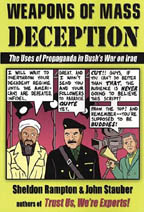
Weapons of Mass Deception: The Uses of Propaganda in Bush’s
War on Iraq — Sheldon Rampton ’82 and John Stauber
(Penguin). The authors analyze the public relations campaign waged
by the Bush administration to sell Operation Iraqi Freedom to the
American people. The book discusses the “big lie” tactic
— repetition and misinformation — and includes a section
on how other countries perceive the U.S. Rampton and Stauber write
and edit PR Watch: Public Interest Reporting on the PR/Public Affairs
Industry.
1983
 The
Marriage of the Sea — Jane Alison ’83 (Farrar, Straus
& Giroux). Alison’s novel follows sets of characters whose
lives cross on interwoven paths of love and loneliness, between
New Orleans and Venice. At the center of it all is Oswaldo, a Venetian
art patron, whose grants, commissions, and avuncular generosity
draw Lucinda, Vera, and Anton to Venice. Meanwhile, Anton’s
emotionally fragile wife and Lucinda’s suitor await their return
in New Orleans, while Vera’s ex-boyfriend roams Venice with
his new lover. Alison is the author of The Love-Artist (2001) and
lives in Germany. The
Marriage of the Sea — Jane Alison ’83 (Farrar, Straus
& Giroux). Alison’s novel follows sets of characters whose
lives cross on interwoven paths of love and loneliness, between
New Orleans and Venice. At the center of it all is Oswaldo, a Venetian
art patron, whose grants, commissions, and avuncular generosity
draw Lucinda, Vera, and Anton to Venice. Meanwhile, Anton’s
emotionally fragile wife and Lucinda’s suitor await their return
in New Orleans, while Vera’s ex-boyfriend roams Venice with
his new lover. Alison is the author of The Love-Artist (2001) and
lives in Germany.
Good Deeds, Good Design: Community Service Through Architecture — Bryan Bell ’83 (Princeton Architectural Press). A collection of 26 architectural essays, all arguing for the important role that architecture plays in the building and reinforcement of community service. Bell lives in Raleigh, North Carolina.
Priceless: On Knowing the Price of Everything and the Value of Nothing — Lisa Heinzerling ’83 and Frank Ackerman (The New Press). A critical look at how economists put a dollar value on intangible risks and awards. Heinzerling is a professor at the Georgetown University Law Center and specializes in environmental law.
Another Green World — Henry Wessells ’83 (Temporary
Culture). A collection of nine previously published stories that
range from narrative book reviews to cautionary fiction written
for Nature. Wessells works in New York.
1984
The National Wildlife Refuges: Coordinating a Conservation System
through Law — edited by Robert Fischman ’84 (Island
Press). An explanation of the laws that govern refuge management,
this book serves as a resource for understanding the role that public
lands play in environmental protection and economic development.
Fischman is a professor of law and Louis F. Niezer Faculty Fellow
at Indiana University School of Law—Bloomington.
The Lake Project — David Maisel ’84 (Nazraeli). A collection of Maisel’s abstract aerial landscapes of California’s Owens Lake and its environs. Maisel is a landscape photographer whose works are in the permanent collections of the Metropolitan Museum of Art, the Brooklyn Museum of Art and the Los Angeles County Museum of Art. The artist is currently working on his next book, in which he explores the Great Salt Lake in Utah.
1985
Mr. Timothy — Louis Bayard ’85 (HarperCollins).
Bayard’s third novel, a historical thriller, tells the story
of post-Christmas Carol Tiny Tim. Now an orphaned young adult, estranged
from “Uncle” Ebenezer, Tim Cratchit is living in a brothel
in exchange for teaching the madam to read. While struggling to
find his place in 1860s London, Tim finds trouble when he dredges
the Thames for dead bodies and the treasures in their pockets. Bayard
also wrote Fool’s Errand (1999) and Endangered Species (2001).
1986
Morte À Deli—Christine Cook ’86 (Porch
Swing Press). D’Arcy W. Carter, an aspiring private investigator,
is hired by her ex-employer to work as an inside investigator of
his deli’s food-loss problem. The first day back the manager
dies, leaving d’Arcy as the main suspect. She must prove otherwise
or lose her job, as well as her dreams of being an investigator.
Cook is an author in Ann Arbor, Michigan.
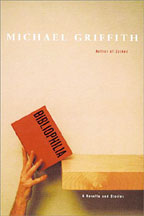 Bibliophilia:
A Novella and Stories — Michael Griffith ’87 (Arcade).
In this, Griffith’s second book, he creates a carnival of characters
ensnared in comic situations: A hair doctor who goes bald. An English
professor trapped in a monkey cage. A librarian who polices the
stacks for chastity’s sake. More. Bibliophilia:
A Novella and Stories — Michael Griffith ’87 (Arcade).
In this, Griffith’s second book, he creates a carnival of characters
ensnared in comic situations: A hair doctor who goes bald. An English
professor trapped in a monkey cage. A librarian who polices the
stacks for chastity’s sake. More.
Undoing Empire: Race and Nation in the Mulatto Caribbean —
Jose F. Buscaglia Salgado ’86 (University of Minnesota).
A discussion of the ways Caribbean aesthetics offer the possibility
of ultimate erasure of racial difference. Buscaglia-Salgado explores
a wide range, from the politics of medieval Iberian societies to
the beginning of direct U.S. hegemony in the Caribbean at the end
of the 19th century, to argue that certain projects of national
liberation have moved contrary to the historical claims to freedom
in the mulatto world. Buscaglia-Salgado is the director of Cuban
and Caribbean programs at the University of Buffalo.
1988
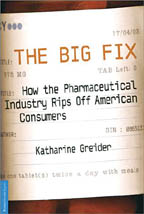 The
Big Fix: How the Pharmaceutical Industry Rips Off American Consumers
— Katharine Greider ’88 (PublicAffairs). The author
points a finger at the drug industry, which, she argues, exploits
customers with high prices and seductive marketing — creating
demand for drugs that many people can’t afford and may not
even need. She also looks at government regulation of the industry.
Greider is a journalist in New York City. The
Big Fix: How the Pharmaceutical Industry Rips Off American Consumers
— Katharine Greider ’88 (PublicAffairs). The author
points a finger at the drug industry, which, she argues, exploits
customers with high prices and seductive marketing — creating
demand for drugs that many people can’t afford and may not
even need. She also looks at government regulation of the industry.
Greider is a journalist in New York City.
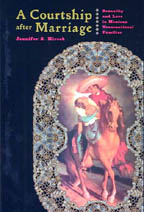 A
Courtship after Marriage: Sexuality and Love in Mexican Transnational
Families — Jennifer S. Hirsch ’88 (University of California).
By focusing on Mexican marriages in Atlanta and in a small Mexican
town, author examines the changing sexual and partnership roles
for today’s immigrant Mexican family. Hirsch is an assistant
professor of international health and anthropology at Emory University. A
Courtship after Marriage: Sexuality and Love in Mexican Transnational
Families — Jennifer S. Hirsch ’88 (University of California).
By focusing on Mexican marriages in Atlanta and in a small Mexican
town, author examines the changing sexual and partnership roles
for today’s immigrant Mexican family. Hirsch is an assistant
professor of international health and anthropology at Emory University.
1989
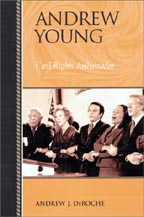 Andrew
Young: Civil Rights Ambassador — Andrew J. DeRoche ’89
(Scholarly Resources). DeRoche explores the rising influence
of race in foreign relations as he examines the contributions of
Young, an African-American activist, politician, and diplomat to
U.S. foreign policy. DeRoche teaches history at Front Range Community
College in Longmont, Colorado. Andrew
Young: Civil Rights Ambassador — Andrew J. DeRoche ’89
(Scholarly Resources). DeRoche explores the rising influence
of race in foreign relations as he examines the contributions of
Young, an African-American activist, politician, and diplomat to
U.S. foreign policy. DeRoche teaches history at Front Range Community
College in Longmont, Colorado.
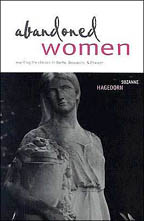 Abandoned
Women: Rewriting the Classics in Dante, Boccaccio, and Chaucer —
Suzanne Hagedorn ’89 (University of Michigan). Focusing
on the vernacular works of Dante, Boccaccio, and Chaucer, the author
argues that revisiting the classical tradition of the abandoned
woman enables these medieval authors to reconsider ancient epics
and myths from a female perspective and question assumptions about
gender roles in medieval literature. Hagedorn is an associate professor
of English at the College of William and Mary. Abandoned
Women: Rewriting the Classics in Dante, Boccaccio, and Chaucer —
Suzanne Hagedorn ’89 (University of Michigan). Focusing
on the vernacular works of Dante, Boccaccio, and Chaucer, the author
argues that revisiting the classical tradition of the abandoned
woman enables these medieval authors to reconsider ancient epics
and myths from a female perspective and question assumptions about
gender roles in medieval literature. Hagedorn is an associate professor
of English at the College of William and Mary.
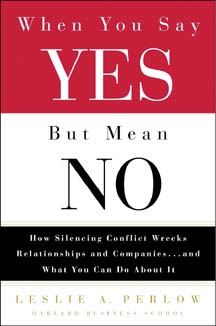 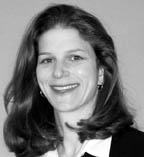 When
You Say Yes but Mean No: How Silencing Conflict Wrecks Relationships
and Companies . . . and What You Can Do About It — Leslie Perlow
’89 (Crown). In her second book, Perlow, an ethnographer,
examines how problems arising in business could be avoided if only
people spoke their minds. More. When
You Say Yes but Mean No: How Silencing Conflict Wrecks Relationships
and Companies . . . and What You Can Do About It — Leslie Perlow
’89 (Crown). In her second book, Perlow, an ethnographer,
examines how problems arising in business could be avoided if only
people spoke their minds. More.
back to top
1990
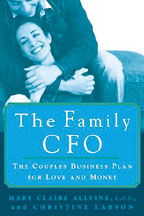 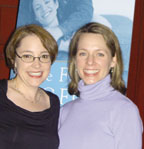 The
Family CFO: The Couple’s Business Plan for Love and Money —
Mary Claire Allvine ’90 and Christine Larson ’90 (Rodale).
This advice book shows readers how to manage cash flow and investments,
divide responsibilities, prioritize goals, and focus on realizing
dreams. More. The
Family CFO: The Couple’s Business Plan for Love and Money —
Mary Claire Allvine ’90 and Christine Larson ’90 (Rodale).
This advice book shows readers how to manage cash flow and investments,
divide responsibilities, prioritize goals, and focus on realizing
dreams. More.
Roman Religion — edited by Clifford Ando ’90 (Edinburgh
University). This volume collects 14 papers on aspects of Roman
religion and its connections with Roman literature, history, and
culture. The papers are chosen to illustrate a range of approaches
from the last century of scholarship. Ando is an associate professor
of classics and history at the University of Southern California.
Oliver — photographs by J. Oliver Lewis, introduction by
John Lewis ’90 (Order at www.2liv.com). A collection of
beautiful photographs taken by John Lewis’ youngest brother,
Oliver, who died in 1998 at age 26 while kayaking the Quijos River
in Ecuador. A tribute to Oliver, the book also includes poetry and
reflections.
Gift-Giving in Japan: Cash, Connections, Cosmologies —
Katherine Rupp ’90 (Stanford). Based on fieldwork in the
Tokyo metropolitan area and other parts of Japan, this book documents
the scale, complexity, and variation of gift giving in contemporary
Japan. Rupp is a lecturer in Yale University’s Department of
Anthropology.
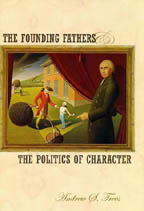 The
Founding Fathers & the Politics of Character — Andrew S.
Trees ’90 (Princeton). Through the writings of Thomas Jefferson,
John Adams, Alexander Hamilton, and James Madison, Trees examines
four attempts to answer the question of national identity that Americans
faced in the wake of the American Revolution. Trees teaches at the
Horace Mann School in New York City. The
Founding Fathers & the Politics of Character — Andrew S.
Trees ’90 (Princeton). Through the writings of Thomas Jefferson,
John Adams, Alexander Hamilton, and James Madison, Trees examines
four attempts to answer the question of national identity that Americans
faced in the wake of the American Revolution. Trees teaches at the
Horace Mann School in New York City.
1991
Comprehensive Facial Rejuvenation: A Practical and Systematic
Guide to Surgical Management of the Aging Face — Samuel L.
Lam ’91 and Edwin F. William, III (Lippincott, Williams
& Wilkins). A comprehensive textbook on management of the aging
face. The book includes two DVDs and 17 surgical and dermatological
procedures for cosmetic facial rejuvenation. Lam is a doctor in
Texas.
1992
A Colony of Citizens: Revolution and Slave Emancipation in the
French Caribbean, 1787-1804 — Laurent Dubois ’92 (University
of North Carolina). Focusing on Guadeloupe, Dubois explores the
slave revolts in the French Caribbean that brought about the 1794
abolition of slavery, the contradictory forms this emancipation
took, and its bloody reversal in the early 19th century. DuBois
is an associate professor history at Michigan State University.
1993
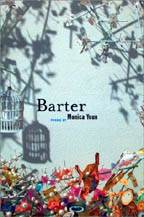 Barter
— Monica Youn ’93 (Graywolf ). The volume of 42 poems
is Youn’s first book of poetry. Youn is an entertainment lawyer
in Manhattan. Barter
— Monica Youn ’93 (Graywolf ). The volume of 42 poems
is Youn’s first book of poetry. Youn is an entertainment lawyer
in Manhattan.
1995
More Things You Need to Be Told — Lesley Carlin ’95
(Berkley). A followup ettiquette book to Things You Need to Be
Told (2001). More.
The Big Bang: Nerve’s Guide to the New Sexual Universe
— Emma Taylor ’95 and Lorelei Sharkey (Plume). With
photographs, illustrations, and step-by-step guides, this how-to
manual explores sexual practices in the new millennium. Taylor is
a contributing editor at Nerve.com and lives in New York City.
 Nerve’s
Guide to Sex Etiquette for Ladies and Gentlemen — Emma Taylor
’95 and Lorelei Sharkey (Plume). This guide to dating and
relationships covers such topics as how to make the first move,
table manners, and the proper Valentine’s Day conduct. Taylor
also coauthored The Big Bang: Nerve’s Guide to the New Sexual
Universe. Nerve’s
Guide to Sex Etiquette for Ladies and Gentlemen — Emma Taylor
’95 and Lorelei Sharkey (Plume). This guide to dating and
relationships covers such topics as how to make the first move,
table manners, and the proper Valentine’s Day conduct. Taylor
also coauthored The Big Bang: Nerve’s Guide to the New Sexual
Universe.
1996
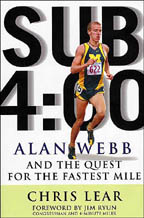 Sub
4:00: Alan Webb and the Quest for the Fastest Mile — Chris
Lear ’96 (Rodale). Lear chronicles Webb’s freshman
year at the University of Michigan as Webb deals with injuries,
the politics of collegiate track, and media scrutiny that comes
with being the fastest high-school miler ever. Lear also wrote Running
with the Buffaloes. Sub
4:00: Alan Webb and the Quest for the Fastest Mile — Chris
Lear ’96 (Rodale). Lear chronicles Webb’s freshman
year at the University of Michigan as Webb deals with injuries,
the politics of collegiate track, and media scrutiny that comes
with being the fastest high-school miler ever. Lear also wrote Running
with the Buffaloes.
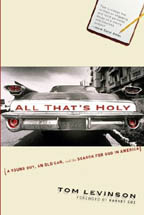 All
That’s Holy: A Young Guy, an Old Car, and the Search for God
in America — Tom Levinson ’96 (Jossey-Bass). Recounts
the author’s road trip across the country in search of understanding
of American spirituality. He creates a portrait of America’s
broad spectrum of religious identities and in the process finds
understanding of his own spiritual life. Levinson is a law student
at the University of Chicago. All
That’s Holy: A Young Guy, an Old Car, and the Search for God
in America — Tom Levinson ’96 (Jossey-Bass). Recounts
the author’s road trip across the country in search of understanding
of American spirituality. He creates a portrait of America’s
broad spectrum of religious identities and in the process finds
understanding of his own spiritual life. Levinson is a law student
at the University of Chicago.
Friends Rule — Ashley Rice ’96 (Blue Mountain
Arts). Rice writes a celebration of friendship in all its facets.
The book includes an interactive page where the reader can record
memories, paste photos, or write down personal thoughts. Rice is
an author/illustrator of greeting cards in Dallas.
Girls Rule — Ashley Rice ’96 (SPS Studios). Written
and illustrated by Rice, this book encourages girls of all ages
to believe in themselves and reach for their dreams. Rice is an
author/illustrator of greeting cards in Dallas.
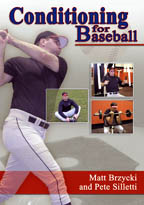 Conditioning
for Baseball — Mat Brzycki and Pete Silletti ’96 (Cardinal).
A comprehensive book on all aspects of baseball training, including
skill training, aerobic and anaerobic conditioning, flexibility,
strength training, nutrition, and agility. Silletti is an assistant
baseball coach at Princeton. Conditioning
for Baseball — Mat Brzycki and Pete Silletti ’96 (Cardinal).
A comprehensive book on all aspects of baseball training, including
skill training, aerobic and anaerobic conditioning, flexibility,
strength training, nutrition, and agility. Silletti is an assistant
baseball coach at Princeton.
 Corporate
Warriors: The Rise of the Privatized Military Industry — P.
W. Singer ’97 (Cornell). The author examines a recent development
in modern warfare: private companies offering specialized military
services for hire. Private military firms range from consulting
firms that sell the strategic advice of retired generals to corporations
that lease out trained commando teams. Singer looks at the risks
that come from outsourcing national security. Singer is a fellow
in foreign policy studies at the Brookings Institution. Corporate
Warriors: The Rise of the Privatized Military Industry — P.
W. Singer ’97 (Cornell). The author examines a recent development
in modern warfare: private companies offering specialized military
services for hire. Private military firms range from consulting
firms that sell the strategic advice of retired generals to corporations
that lease out trained commando teams. Singer looks at the risks
that come from outsourcing national security. Singer is a fellow
in foreign policy studies at the Brookings Institution.
1998
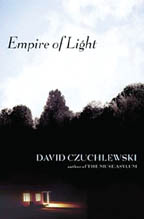 Empire
of Light — David Czuchlewski ’98 (Putnam). Czuchlewski’s
second novel, Empire
of Light — David Czuchlewski ’98 (Putnam). Czuchlewski’s
second novel,
a mystical mystery, tells the story of underachieving Princeton
alumnus Matt Kelly. When Kelly’s formerly rich ex-girlfriend
reappears in his life, penniless and a member of a secret religious
organization called Imperium Luminis, Kelly tries to save her by
joining the cult himself. Czuchlewski is a medical resident at New
York Weill Cornell Medical Center.
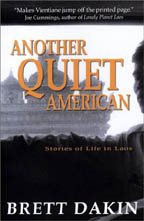 Another
Quiet American: Stories of Life in Laos — Brett Dakin ’98
(Asia Books). Based on his Princeton in Asia experience, Dakin
describes his two-years working as a language and marketing consultant
at the National Tourism Authority of the Lao People’s Democratic
Republic. Dakin is a student at Harvard Law School. Another
Quiet American: Stories of Life in Laos — Brett Dakin ’98
(Asia Books). Based on his Princeton in Asia experience, Dakin
describes his two-years working as a language and marketing consultant
at the National Tourism Authority of the Lao People’s Democratic
Republic. Dakin is a student at Harvard Law School.
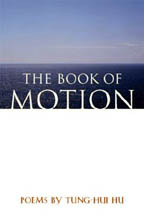 The
Book of Motion — Tung-Hui Hu ’98 (University of Georgia).
Originally Hu’s senior thesis, this book is a collection of
poems about climbing a hill, love, and growing up among other subjects.
Hu is a doctoral student in architecture at the University of California,
Berkeley. The
Book of Motion — Tung-Hui Hu ’98 (University of Georgia).
Originally Hu’s senior thesis, this book is a collection of
poems about climbing a hill, love, and growing up among other subjects.
Hu is a doctoral student in architecture at the University of California,
Berkeley.
2000
No Debate: How the Republicans and Democratic Parties Secretly
Control the Presidential Debates — George Farah ’00
(Seven Stories). Farah presents a behind-the-scenes view of the
U.S. presidential debates, discussing how the Democrats and the
Republicans run the debates at the electorate’s expense. Farah
is an executive director of Open Debates in Washington, D.C.
The Movies of My Life — Alberto Fuguet, translated by Ezra
E. Fitz ’00 (Rayo/HarperCollins). Fitz translates the story
of Beltran, a Chilean seismologist, who uses a list of favorite
films to trace and narrate his young émigré childhood
in California, his return to Chile as a 10-year-old during the tumultuous
1970s and adulthood in Santiago. Fitz lives in New York City.
2001
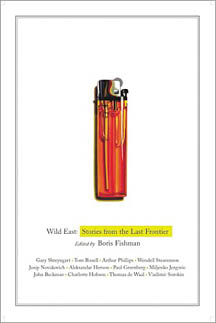 Wild
East: Stories from the Last Frontier — edited by Boris Fishman
’01 (Justin, Charles & Co.). This anthology of short
fiction about the former Soviet Union and Eastern Europe gathers
stories by 12 young authors — émigrés to the
West and Americans abroad — writing about the region today.
The collection includes a story about a staged love affair between
a C.I.A. agent and a Czech intelligence officer and a story about
the victims of Russia’s war in Chechnya. Fishman is on the
editorial staff of the New Yorker. Wild
East: Stories from the Last Frontier — edited by Boris Fishman
’01 (Justin, Charles & Co.). This anthology of short
fiction about the former Soviet Union and Eastern Europe gathers
stories by 12 young authors — émigrés to the
West and Americans abroad — writing about the region today.
The collection includes a story about a staged love affair between
a C.I.A. agent and a Czech intelligence officer and a story about
the victims of Russia’s war in Chechnya. Fishman is on the
editorial staff of the New Yorker.
back to top
By
Graduate Alumni (Listed alphabetically by author)
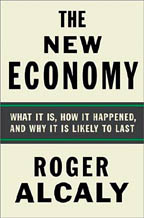 The
New Economy — Roger Alcaly *69 (Farrar, Straus & Giroux).
Alcaly describes how the American economy has changed over the last
few decades of the 20th century in response to new technologies,
global competition, and innovations in world financial markets.
These changes will result in increased productivity and prosperity,
he argues, but the evolution of a “new economy” can be
a slow and erratic process. Alcaly is a hedge-fund manager and an
economist. The
New Economy — Roger Alcaly *69 (Farrar, Straus & Giroux).
Alcaly describes how the American economy has changed over the last
few decades of the 20th century in response to new technologies,
global competition, and innovations in world financial markets.
These changes will result in increased productivity and prosperity,
he argues, but the evolution of a “new economy” can be
a slow and erratic process. Alcaly is a hedge-fund manager and an
economist.
Conceiving Risk, Bearing Responsibility — Elizabeth M. Armstrong *93 (Johns Hopkins). A sociological exploration of the link between alcohol consumption and pregnancy risks. Armstrong is an assistant professor of sociology and public affairs at Princeton. What is Thought? — Eric Baum *82 (MIT). Baum discusses
his theories of what meaning and consciousness are, how humans function,
and why we think the things we do — all in computational and
evolutionary terms. Baum is a senior research scientist at NEC Laboratories
America.
Roman Catholics and Shi’i Muslims: Prayer, Passion, and
Politics — James A. Bill *68 and John Alden Williams (University
of North Carolina Press). Focuses on the similarities between Roman
Catholicism and Shi’i Islam, citing key figures and common
doctrinal, structural, and sociopolitical characteristics. Bill
is a professor of international studies and government at the College
of William and Mary.
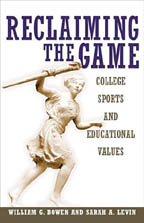 Reclaiming
the Game: College Sports and Educational Values —William G.
Bowen *58 and Sarah A. Levin (Princeton). This study, which
builds on Bowen’s book The Game of Life (2001), looks at the
widening divide between the academic mission of elite colleges and
universities, and the role of athletics on campus. Bowen and Levin
advocate reducing the number of recruited athletes and raising academic
standards for them, among other reforms. A former president of Princeton,
Bowen is president of the Andrew W. Mellon Foundation. Levin is
a graduate student at the Harvard School of Public Health. An interview
with Bowen is planned for a future issue of PAW. Reclaiming
the Game: College Sports and Educational Values —William G.
Bowen *58 and Sarah A. Levin (Princeton). This study, which
builds on Bowen’s book The Game of Life (2001), looks at the
widening divide between the academic mission of elite colleges and
universities, and the role of athletics on campus. Bowen and Levin
advocate reducing the number of recruited athletes and raising academic
standards for them, among other reforms. A former president of Princeton,
Bowen is president of the Andrew W. Mellon Foundation. Levin is
a graduate student at the Harvard School of Public Health. An interview
with Bowen is planned for a future issue of PAW.
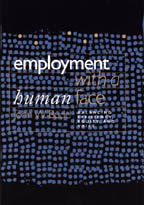 Employment
with a Human Face: Balancing Efficiency, Equity, and Voice —
John W. Budd *91 (Cornell University). Budd calls into question
traditional objectives of employment — efficiency, productivity,
and competition — and argues that human concerns like equity
and voice need to be factored into the root of employment aims.
Budd is Industrial Relations Landgrant Term Professor at the Carlson
School of Management, University of Minnesota. Employment
with a Human Face: Balancing Efficiency, Equity, and Voice —
John W. Budd *91 (Cornell University). Budd calls into question
traditional objectives of employment — efficiency, productivity,
and competition — and argues that human concerns like equity
and voice need to be factored into the root of employment aims.
Budd is Industrial Relations Landgrant Term Professor at the Carlson
School of Management, University of Minnesota.
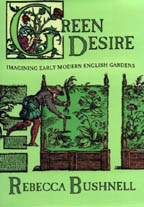 Green
Desire: Imagining Early Modern English Gardens — Rebecca Bushnell
*83 (Cornell). Bushnell describes the innovate design of old
gardening manuals, examining how writers and printers marketed them
as fiction as well as practical advice for aspiring gardeners. Bushnell
is a professor of English and dean of the college at the University
of Pennsylvania. Green
Desire: Imagining Early Modern English Gardens — Rebecca Bushnell
*83 (Cornell). Bushnell describes the innovate design of old
gardening manuals, examining how writers and printers marketed them
as fiction as well as practical advice for aspiring gardeners. Bushnell
is a professor of English and dean of the college at the University
of Pennsylvania.
 The
Work of the Sun: New and Selected Poems, 1991-2002 — Charles
Edward Eaton *37 (Cornwall Books). This collection includes
selections from Eaton’s published poems of the last 15 years,
as well as over 30 new poems. Eaton writes on such subjects as loneliness,
love affairs, and memory. Eaton lives in Chapel Hill, North Carolina. The
Work of the Sun: New and Selected Poems, 1991-2002 — Charles
Edward Eaton *37 (Cornwall Books). This collection includes
selections from Eaton’s published poems of the last 15 years,
as well as over 30 new poems. Eaton writes on such subjects as loneliness,
love affairs, and memory. Eaton lives in Chapel Hill, North Carolina.
 The
Plaza Mayor and the Shaping of Baroque Madrid — Jesús
Escobar *96 (Cambridge). This book examines the transformation
of Madrid from a secondary market town to the capital of the worldwide
Spanish Habsburg empire. Escobar discusses how the shaping of the
city’s square, Plaza Mayor, reflects the bureaucratic nature
of government in Madrid. Escobar is an associate professor of art
history at Fairfield University. The
Plaza Mayor and the Shaping of Baroque Madrid — Jesús
Escobar *96 (Cambridge). This book examines the transformation
of Madrid from a secondary market town to the capital of the worldwide
Spanish Habsburg empire. Escobar discusses how the shaping of the
city’s square, Plaza Mayor, reflects the bureaucratic nature
of government in Madrid. Escobar is an associate professor of art
history at Fairfield University.
back to top
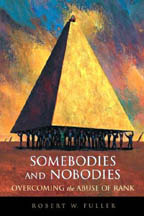 Somebodies
and Nobodies: Overcoming the Abuse of Rank — Robert W. Fuller
*61 (New Society). This book identifies a form of discrimination
called “rankism,” the abuse of power by high-ranking individuals
and the indignity and humiliation it causes people of lower rank.
Rankism, argues the author, underlies many facets of society, from
personal relationships to international relations. Fuller is a former
president of Oberlin College. Somebodies
and Nobodies: Overcoming the Abuse of Rank — Robert W. Fuller
*61 (New Society). This book identifies a form of discrimination
called “rankism,” the abuse of power by high-ranking individuals
and the indignity and humiliation it causes people of lower rank.
Rankism, argues the author, underlies many facets of society, from
personal relationships to international relations. Fuller is a former
president of Oberlin College.
Susan Glaspell in Context: American Theater, Culture, and Politics,
1915-48 — Ellen J. Gainor *88 (University of Michigan).
Gainor writes about the dramatic work of American playwright Susan
Glaspell, claiming it is best understood in the context of Greenwich
Village bohemia and American modernism. Gainor is a professor at
Cornell University.
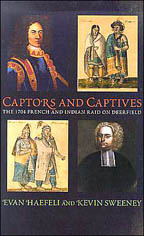 Captors
and Captives: The 1704 French and Indian Raid on Deerfield —
Evan Haefeli *00 and Kevin Sweeney (University of Massachusetts
Press). Haefeli and Sweeney examine the 1704 attack on the Massachusetts
village of Deerfield by a party of French and Indian raiders. The
authors reconstruct the battle from several viewpoints and describe
a number of possible reasons the attack occurred. Haefeli is assistant
professor of history at Tufts University. Captors
and Captives: The 1704 French and Indian Raid on Deerfield —
Evan Haefeli *00 and Kevin Sweeney (University of Massachusetts
Press). Haefeli and Sweeney examine the 1704 attack on the Massachusetts
village of Deerfield by a party of French and Indian raiders. The
authors reconstruct the battle from several viewpoints and describe
a number of possible reasons the attack occurred. Haefeli is assistant
professor of history at Tufts University.
Journal of a Residence in Chile: During the Year 1822, and a
Voyage from Chile to Brazil in 1823—Maria Graham, edited by
Jennifer Hayward *92 (University of Virginia). This new edition
of Graham’s 1924 book provides one of the few extant eyewitness
accounts of the independence movement in Chile. Graham provides
analysis of political events, discusses meetings with major historical
figures, and depicts Chile during the 1820s. Hayward is an associate
professor of English at College of Wooster.
 The
Education of Historians for the Twenty-first Century — Philip
M. Katz *94, Colin Palmer, Thomas Bender, and the Committee
on Graduate Education of the American Historical Association (University
of Illinois). A comprehensive investigation and report on the state
of graduate programs in history. The book explains the study’s
results and offers recommendations for improving graduate education.
Katz is the research director for graduate education at the American
Historical Association. Palmer is Dodge Professor of History at
Princeton and chair of the A.H.A. Committee on Graduate Education. The
Education of Historians for the Twenty-first Century — Philip
M. Katz *94, Colin Palmer, Thomas Bender, and the Committee
on Graduate Education of the American Historical Association (University
of Illinois). A comprehensive investigation and report on the state
of graduate programs in history. The book explains the study’s
results and offers recommendations for improving graduate education.
Katz is the research director for graduate education at the American
Historical Association. Palmer is Dodge Professor of History at
Princeton and chair of the A.H.A. Committee on Graduate Education.
Learn to Read Latin and Learn to Read Latin Workbook—Andrew
Keller *91 and Stephanie Russell (Yale University). When used
together, these too books form a Latin grammar and reader, presenting
basic Latin morphology and syntax and direct access to works of
Latin literature, including authors such as Caesar, Cicero, and
Ovid. The workbook provides drills for each chapter in the textbook.
Keller is an associate professor of the classics at Colgate University.
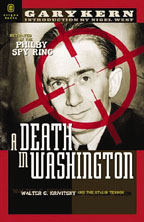 A
Death in Washington: Walter G. Krivitsky and the Stalin Terror —
Gary Kern *69 (Enigma). Kern investigates the career of Krivitsky,
a Soviet superspy who, disillusioned by Stalin’s purges, defected
in 1937 and escaped to France and then the U.S. Using archival sources,
Kern also explores Krivitsky’s death in 1941, officially ruled
a suicide, but suspected by many to be a revenge killing ordered
by Stalin. Kern is a translator and specialist in Russian literature.
By Lucia S. Smith ’04 A
Death in Washington: Walter G. Krivitsky and the Stalin Terror —
Gary Kern *69 (Enigma). Kern investigates the career of Krivitsky,
a Soviet superspy who, disillusioned by Stalin’s purges, defected
in 1937 and escaped to France and then the U.S. Using archival sources,
Kern also explores Krivitsky’s death in 1941, officially ruled
a suicide, but suspected by many to be a revenge killing ordered
by Stalin. Kern is a translator and specialist in Russian literature.
By Lucia S. Smith ’04
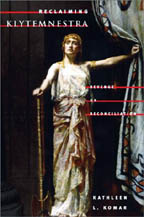 Reclaiming
Klytemnestra: Revenge or Reconciliation — Kathleen L. Komar
*77 (University of Illinois). A study of the influence the Greek
queen Klytemnestra has on women’s roles today. Komar is a professor
of comparative literature and German at UCLA. Reclaiming
Klytemnestra: Revenge or Reconciliation — Kathleen L. Komar
*77 (University of Illinois). A study of the influence the Greek
queen Klytemnestra has on women’s roles today. Komar is a professor
of comparative literature and German at UCLA.
Shaping American Military Capabilities after the Cold War —
Richard A. Lacquement Jr. *00 (Praeger). In the aftermath of
the Soviet Union’s collapse, the American military bureaucracy
failed to effect changes necessary for the 21st century, argues
the author. This book analyzes a decade of inactivity and the military’s
probable inadequacy for the information age and the war against
terrorism. Lacquement is a member of the faculty of the U.S. Naval
War College.
back to top
Alternatives to History — Jay Ladin *00 (Sheep Meadow
Press). A collection of poems that looks at the different kinds
of history, including social history, family history, and human
history. Topics include AIDS elegies and the Israeli-Palestinian
conflict. Ladin is an English professor at Stern College of Yeshiva
University.
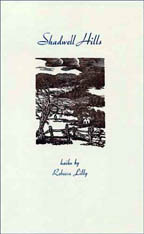 Shadwell
Hills — Rebecca Lilly *02 (Birch Brook Press). This collection
of haiku focuses on nature, as Lilly writes about summer breezes,
autumn cool, and winter frost. Lilly works as a freelance writer
in Port Republic, Virginia. Shadwell
Hills — Rebecca Lilly *02 (Birch Brook Press). This collection
of haiku focuses on nature, as Lilly writes about summer breezes,
autumn cool, and winter frost. Lilly works as a freelance writer
in Port Republic, Virginia.
 You
Want to Sell me A Small Antique — Rebecca Lilly *02 (Gibbs
Smith). In this collection of poems Lilly writes about the everyday
and the mystical, including trips to a fortune-teller and the strangeness
of looking at old photographs. Lilly works as a freelance writer
in Port Republic, Virginia. You
Want to Sell me A Small Antique — Rebecca Lilly *02 (Gibbs
Smith). In this collection of poems Lilly writes about the everyday
and the mystical, including trips to a fortune-teller and the strangeness
of looking at old photographs. Lilly works as a freelance writer
in Port Republic, Virginia.
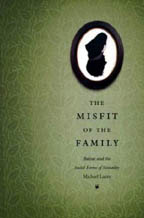 The
Misfit of the Family: Balzac and the Social Forms of Sexuality —
Michael Lucey *89 (Duke). In this analysis of Balzac’s
fictional universe, Lucey argues that Balzac used his writing to
analyze and represent various forms of sexuality, particularly as
they relate to family, history, economics, and law. Lucey is a professor
of French and comparative literature at the University of California,
Berkeley. The
Misfit of the Family: Balzac and the Social Forms of Sexuality —
Michael Lucey *89 (Duke). In this analysis of Balzac’s
fictional universe, Lucey argues that Balzac used his writing to
analyze and represent various forms of sexuality, particularly as
they relate to family, history, economics, and law. Lucey is a professor
of French and comparative literature at the University of California,
Berkeley.
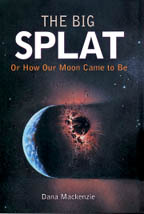 The
Big Splat, or How Our Moon Came to Be — Dana MacKenzie *83
(Wiley). The story of the moon’s formation. The author traces
three of history’s most popular lunar creation theories and
explores the recent and little known theory for the true origin
of the Moon. Mackenzie is a freelance science writer in California. The
Big Splat, or How Our Moon Came to Be — Dana MacKenzie *83
(Wiley). The story of the moon’s formation. The author traces
three of history’s most popular lunar creation theories and
explores the recent and little known theory for the true origin
of the Moon. Mackenzie is a freelance science writer in California.
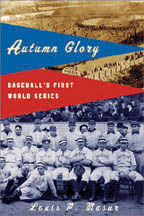 Autumn
Glory: Baseball’s First World Series — Louis P. Masur
*85 (Hill & Wang). In 1903 the Pittsburgh Pirates challenged
the underdog Boston Americans to a postseason play-off and ended
up losing four games to five. Masur chronicles the story of this
first World Series and how it saved baseball, a sport that had been
splintering due to greed, labor strife, and unrest. Masur is a history
professor at City College of New York and the editor of Reviews
in American History. Autumn
Glory: Baseball’s First World Series — Louis P. Masur
*85 (Hill & Wang). In 1903 the Pittsburgh Pirates challenged
the underdog Boston Americans to a postseason play-off and ended
up losing four games to five. Masur chronicles the story of this
first World Series and how it saved baseball, a sport that had been
splintering due to greed, labor strife, and unrest. Masur is a history
professor at City College of New York and the editor of Reviews
in American History.
 Naked
Tropics: Essays on Empire and Other Rogues — Kenneth Maxwell
*70 (Routledge). A collection of essays exploring the tropics,
especially Brazil. Covers such topics as the suppression of the
Jesuits in the Amazon, Brazilian Independence, and the origins of
chocolate. Maxwell is the David Rockefeller Chair in Inter-American
Studies at the Council on Foreign Relations and is the Western Hemisphere
book reviewer for Foreign Affairs. Naked
Tropics: Essays on Empire and Other Rogues — Kenneth Maxwell
*70 (Routledge). A collection of essays exploring the tropics,
especially Brazil. Covers such topics as the suppression of the
Jesuits in the Amazon, Brazilian Independence, and the origins of
chocolate. Maxwell is the David Rockefeller Chair in Inter-American
Studies at the Council on Foreign Relations and is the Western Hemisphere
book reviewer for Foreign Affairs.
 The
Dust of Empire: The Race for Mastery in the Asian Heartland —
Karl E. Meyer *56 (PublicAffairs). In this introduction to a
poorly understood region, the author traces the histories of Afghanistan,
Iran, Pakistan, Russia, five Central Asian republics (Kazakhstan,
Uzbekistan, Tajikistan, Turkmenistan, Kyrgyzstan), and the Caucasus
(Georgia, Armenia, Azerbaijan) — all of which are critical
to American interests today. Meyer also examines the impact of the
great powers on the region. Meyer is the editor of World Policy
Journal. The
Dust of Empire: The Race for Mastery in the Asian Heartland —
Karl E. Meyer *56 (PublicAffairs). In this introduction to a
poorly understood region, the author traces the histories of Afghanistan,
Iran, Pakistan, Russia, five Central Asian republics (Kazakhstan,
Uzbekistan, Tajikistan, Turkmenistan, Kyrgyzstan), and the Caucasus
(Georgia, Armenia, Azerbaijan) — all of which are critical
to American interests today. Meyer also examines the impact of the
great powers on the region. Meyer is the editor of World Policy
Journal.
Lean Enterprise Value: Insights from MIT’s Lean Aerospace
Initiative — coauthored by Earll Murman ’63 *67 (Palgrave).
Provides a new agenda for the aerospace industry and redefines and
develops the concept of Lean as a framework for enterprise transformation.
Murman is a professor of aeronautics and astronautics and program
director of the Lean Aerospace Initiative at M.I.T.
 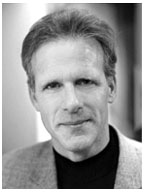 Reunion
— Michael Oren *86 (MacAdam/Cage). In this book, the author's
first novel, Oren draws on his own father's memories to craft a
story about World War II. Oren, who has a doctorate in Near Eastern
studies, also wrote Six Days of War: June 1967 and the Making
of the Modern Middle East (2002). More. Reunion
— Michael Oren *86 (MacAdam/Cage). In this book, the author's
first novel, Oren draws on his own father's memories to craft a
story about World War II. Oren, who has a doctorate in Near Eastern
studies, also wrote Six Days of War: June 1967 and the Making
of the Modern Middle East (2002). More.
Daybreak at the Straits — Eric Ormsby *81 (Zoo). This
collection of poetry contains a range of poetic styles and topics.
Ormsby is a professor at McGill’s Institute of Islamic Studies
in Montreal.
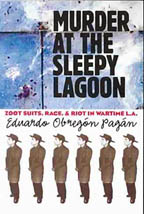 Murder
at the Sleepy Lagoon: Zoot Suits, Race, & Riot in Wartime L.A.—Eduardo
Obregón Pagán *96 (University of North Carolina).
Pagan provides a social history of the 1942 murder trial and conviction
of 17 Mexican-American men as well as the Zoot Suit Riot five months
later. Pagan argues that both the trial and the riot resulted not
just from anti-Mexican feelings, but from pre-existing stresses
such as demographic pressures and anxiety about youth culture. Pagan
is senior academic advisor and program officer at the National Endowment
for the Humanities. Murder
at the Sleepy Lagoon: Zoot Suits, Race, & Riot in Wartime L.A.—Eduardo
Obregón Pagán *96 (University of North Carolina).
Pagan provides a social history of the 1942 murder trial and conviction
of 17 Mexican-American men as well as the Zoot Suit Riot five months
later. Pagan argues that both the trial and the riot resulted not
just from anti-Mexican feelings, but from pre-existing stresses
such as demographic pressures and anxiety about youth culture. Pagan
is senior academic advisor and program officer at the National Endowment
for the Humanities.
back to top
Japanese Tea Culture — edited by Morgan Pitelka *01
(RoutledgeCurzon). Historical and anthropological essays on the
politics, aesthetics, and myths about the tea culture of Japan.
Pitelka is an assistant professor of Asian studies at Occidental
College.
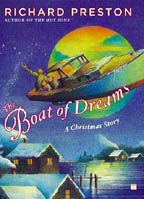 The
Boat of Dreams: A Christmas Story — Ricahrd Preston *83
(Touchstone). Preston originally wrote this uplifting story several
years ago for a friend who was dying of breast cancer. The Boat
of Dreams is about a family whose father was lost in action in Vietnam.
Often home alone, the two children notice that a cranky ghost has
been visiting their trailer. But soon they find the “ghost”
is Santa Claus himself. Author of The Hot Zone (1994), Preston is
a contributor to the New Yorker. The
Boat of Dreams: A Christmas Story — Ricahrd Preston *83
(Touchstone). Preston originally wrote this uplifting story several
years ago for a friend who was dying of breast cancer. The Boat
of Dreams is about a family whose father was lost in action in Vietnam.
Often home alone, the two children notice that a cranky ghost has
been visiting their trailer. But soon they find the “ghost”
is Santa Claus himself. Author of The Hot Zone (1994), Preston is
a contributor to the New Yorker.
Master ArcGIS — Maribeth Price *95 (McGraw-Hill). This
book provides an introduction to Geographic Information Systems
(GIS) for students and professionals. It includes tutorials, problem
sets, and data, as well as a CD-Rom of demonstrations. Price is
an associate professor of geology at the South Dakota School of
Mines and Technology.
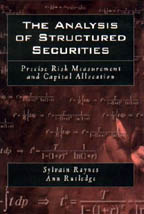 The
Analysis of Structured Securities: Precise Risk Measurement and
Capital Allocation — Sylvain Raynes *86 and Ann Rutledge
(Oxford). A reference for the assessment of the credit quality of
structured securities, beginning with “Market Basics.”
Raynes is a founding partner of R&R Consulting. The
Analysis of Structured Securities: Precise Risk Measurement and
Capital Allocation — Sylvain Raynes *86 and Ann Rutledge
(Oxford). A reference for the assessment of the credit quality of
structured securities, beginning with “Market Basics.”
Raynes is a founding partner of R&R Consulting.
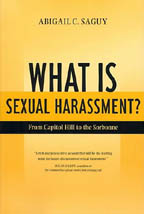 What
is Sexual Harassment? From Capitol Hill to the Sorbonne — Abigail
C. Saguy *00 (University of California). Compares the divergent
attitudes towards sexual harassment in France and the United States
by examining legal and social practices within each of these cultural
contexts. Saguy is an assistant professor of sociology at UCLA. What
is Sexual Harassment? From Capitol Hill to the Sorbonne — Abigail
C. Saguy *00 (University of California). Compares the divergent
attitudes towards sexual harassment in France and the United States
by examining legal and social practices within each of these cultural
contexts. Saguy is an assistant professor of sociology at UCLA.
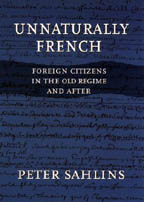 Unnaturally
French: Foreign Citizens in the Old Regime and After — Peter
Sahlins *86 (Cornell University). Rather than date the establishment
of modern political citizenship and nationality law from the French
Revolution of 1789, Sahlins argues that the transformation began
in the “citizenship revolution” of the 18th century. Sahlins
also documents how changes in nationality law and political culture
in the 18th century led to the much contested abolition of the distinction
between foreigners and citizens. Sahlins is a professor of history
at the University of California at Berkeley. Unnaturally
French: Foreign Citizens in the Old Regime and After — Peter
Sahlins *86 (Cornell University). Rather than date the establishment
of modern political citizenship and nationality law from the French
Revolution of 1789, Sahlins argues that the transformation began
in the “citizenship revolution” of the 18th century. Sahlins
also documents how changes in nationality law and political culture
in the 18th century led to the much contested abolition of the distinction
between foreigners and citizens. Sahlins is a professor of history
at the University of California at Berkeley.
Efficiency and Sustainability in the Energy and Chemical Industries
— Krishnan Sankaranarayanan *02 (Dekker). The author uses
common engineering concepts to describe principles of irreversible
thermodynamics and provides the tools to help engineers recognize
why losses occur and how they can be reduced through knowledge of
thermodynamic principles. Sankaranarayanan works for ExxonMobil
in Fairfax, Virginia.
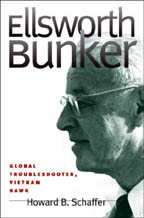 Ellsworth
Bunker: Global Troubleshooter, Vietnam Hawk — Howard B. Schaffer
*70 (University of North Carolina Press). Schaffer traces the
life of American diplomat Bunker (1894-1984) from his careers as
a businessman and lobbyist to his six-year assignment as ambassador
to South Vietnam and role in the negotiation and enactment of the
Panama Canal Treaties. Schaffer is director of studies at the Institute
for the Study of Diplomacy at Georgetown University. Ellsworth
Bunker: Global Troubleshooter, Vietnam Hawk — Howard B. Schaffer
*70 (University of North Carolina Press). Schaffer traces the
life of American diplomat Bunker (1894-1984) from his careers as
a businessman and lobbyist to his six-year assignment as ambassador
to South Vietnam and role in the negotiation and enactment of the
Panama Canal Treaties. Schaffer is director of studies at the Institute
for the Study of Diplomacy at Georgetown University.
Ordinary and Partial Differential Equation Routines in C, C++,
Fortran, Java, Maple, and MATLAB — H.J. Lee and W.E. Schiesser
*60 (Chapman & Hall). This reference book provides a set
of ODE/PDE integration routines in the six most widely used computer
languages. It features reviews of integration algorithms and analysis
of the Runge Kutta method, as well as the source code for the six
languages covered. Schiesser is the R. L. McCann Professor of Engineering
and Mathematics at Lehigh University.
Laurentian Codicil — Richard J. Schoeck *49 (Mellen Poetry). A poem that envisions the journey of a cremated body down the St. Lawrence River to the sea. Now retired, Schoeck had taught English at various universities. back to top
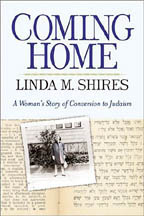 Coming
Home: A Woman’s Story of Conversion to Judaism — Linda
M. Shires *81 (Westview). About 20 years after marrying a Jewish
man, Shires, raised Protestant, converted to Judaism. This book
chronicles her spiritual journey and explores the aspects of Judaism
that she wrestles with, such as Orthodox and Conservative views
on homosexuality and women. A professor of English and textual studies
at Syracuse University, she also teaches in the Judaic studies program
there. Coming
Home: A Woman’s Story of Conversion to Judaism — Linda
M. Shires *81 (Westview). About 20 years after marrying a Jewish
man, Shires, raised Protestant, converted to Judaism. This book
chronicles her spiritual journey and explores the aspects of Judaism
that she wrestles with, such as Orthodox and Conservative views
on homosexuality and women. A professor of English and textual studies
at Syracuse University, she also teaches in the Judaic studies program
there.
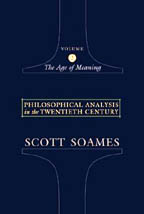 Philosophical
Analysis in the Twentieth Century: Volume 2: The Age of Meaning
— Scott Soames (Princeton University Press). In this second
volume, Soames tells a wide-ranging history of analytic philosophy
from the 1950s to present-day. Soams is a professor of philosophy
at Princeton. Philosophical
Analysis in the Twentieth Century: Volume 2: The Age of Meaning
— Scott Soames (Princeton University Press). In this second
volume, Soames tells a wide-ranging history of analytic philosophy
from the 1950s to present-day. Soams is a professor of philosophy
at Princeton.
Managing Armed Conflicts in the 21st Century — edited by
Chandra Lehka Sriram *00 and Adekeye Adebjo (Frank Cass). Drawing
on lessons from conflicts of the 1990s, this collection of essays
suggests new approaches and tools for conflict management for policy
makers.
From Promise to Practice: Strengthening UN Capacities for
the Prevention of Violent Conflict — edited by Chandra Lekha
Sriram *00 and Karin Wermester (Lynne Rienner). This book
uses detailed case studies and analysis to provide lessons about
handling international conflict. Sriram is an associate at the International
Peace Academy, where she directs the conflict prevention project.
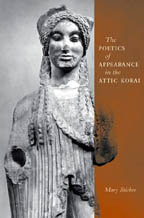 The
Poetics of Appearance in the Attic Korai — Mary Stieber *92
(University of Texas). Stieber challenges the longstanding view
that Archaic Athenian sculptures are generic female images, arguing
that they are instead highly individualized, mimetically realistic
representations of Archaic young women, perhaps even portraits of
real people. Stieber is an assistant professor of art history at
the Cooper Union for the Advancement of Science and Art in New York
City. The
Poetics of Appearance in the Attic Korai — Mary Stieber *92
(University of Texas). Stieber challenges the longstanding view
that Archaic Athenian sculptures are generic female images, arguing
that they are instead highly individualized, mimetically realistic
representations of Archaic young women, perhaps even portraits of
real people. Stieber is an assistant professor of art history at
the Cooper Union for the Advancement of Science and Art in New York
City.
 Bodies
Politic: Negotiating Race in the American North, 1730-1830—John
Wood Sweet *95 (Johns Hopkins). Grounded in original sources
such as court records and censuses, Sweet argues that the coming
together of Indians, Europeans, and Africans profoundly shaped the
character of colonial New England, the meaning of the American Revolution,
and the founding of American democracy. Sweet is an assistant professor
of history at the University of North Carolina at Chapel Hill. Bodies
Politic: Negotiating Race in the American North, 1730-1830—John
Wood Sweet *95 (Johns Hopkins). Grounded in original sources
such as court records and censuses, Sweet argues that the coming
together of Indians, Europeans, and Africans profoundly shaped the
character of colonial New England, the meaning of the American Revolution,
and the founding of American democracy. Sweet is an assistant professor
of history at the University of North Carolina at Chapel Hill.
Islam in the African-American Experience (2nd edition) —
Richard Brent Turner *86 (Indiana University). Turner traces
the involvement of black Americans with Islam from the earliest
days of African presence in North America. This second edition includes
a discussion of African-American Islam in a post 9/11 context. Turner
is an associate professor in the African-American world studies
program at the University of Iowa.
The Joint Venture — Gilbert Visconti (aka Eric Youngquist
*63) (Voyageur). A suspense/thriller set in Italy about a terrorist
plot. Two Boston attorneys are thrown into a web of violence as
they try to combat a hired killer and a band of desperate terrorists.
 The
March Up: Taking Baghdad with the 1st Marine Division — Bing
West *67 and Major General Ray L. Smith (Bantam). Bing and Smith
give personal accounts of their experiences in ground combat during
Iraqi Freedom. The two traveled with 18 different units, seeing
combat on 16 days. West served as Assistant Secretary of Defense
for International Affairs in the Reagan administration. The
March Up: Taking Baghdad with the 1st Marine Division — Bing
West *67 and Major General Ray L. Smith (Bantam). Bing and Smith
give personal accounts of their experiences in ground combat during
Iraqi Freedom. The two traveled with 18 different units, seeing
combat on 16 days. West served as Assistant Secretary of Defense
for International Affairs in the Reagan administration.
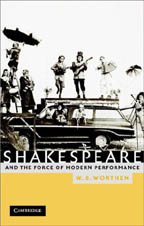 Shakespeare
and the Force of Modern Performance — W. B. Worthen *81
(Cambridge). By exploring the evolution of the performance of Shakespeare’s
works across cultures, genres, and mediums, the author argues that
a dramatic text cannot shape the vision of the performer. Worthen
is a professor and chair of the Department of Theater, Dance, and
Performance Studies at UC, Berkeley. Shakespeare
and the Force of Modern Performance — W. B. Worthen *81
(Cambridge). By exploring the evolution of the performance of Shakespeare’s
works across cultures, genres, and mediums, the author argues that
a dramatic text cannot shape the vision of the performer. Worthen
is a professor and chair of the Department of Theater, Dance, and
Performance Studies at UC, Berkeley.
back to top
By
Faculty (Listed
alphabetically by author)
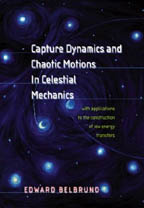 Capture
Dynamics and Chaotic Motions in Celestial Mechanics: With Applications
to the Construction of Low Energy Transfers — Edward Belbruno
(Princeton University). Describes a new approach to determining
low energy routes for spacecraft and comets by exploiting regions
in space where motion is very sensitive (or chaotic). Belbruno is
a visiting research collaborator in the Program in Applied and Computational
Mathematics. Capture
Dynamics and Chaotic Motions in Celestial Mechanics: With Applications
to the Construction of Low Energy Transfers — Edward Belbruno
(Princeton University). Describes a new approach to determining
low energy routes for spacecraft and comets by exploiting regions
in space where motion is very sensitive (or chaotic). Belbruno is
a visiting research collaborator in the Program in Applied and Computational
Mathematics.
Ordinary People in Extraordinary Times: The Citizenry and the
Breakdown of Democracy — Nancy Bermeo (Princeton). Going
against common belief, Bermeo argues that democratic collapses are
caused less by changes in popular preferences than by the actions
of political elites who polarize themselves and mistake the actions
of a few for the preferences of many. Bermeo is a professor of politics.
The Art of Structural Design: A Swiss Legacy — David Billington
’50 (Yale). This book surveys the works of several artistic
engineers from the Federal Institute of Technology in Zurich, documenting
the Swiss legacy of aesthetical engineering. Structures reviewed
include the Verrazano Narrows Bridge and the Heimberg Indoor Tennis
Centre. Billington is the director of the Program in Architecture
and Engineering.
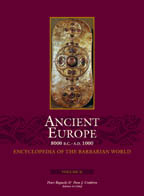 Ancient
Europe, 8000 B.C. to A.D. 1000: An Encyclopedia of the Barbarian
World — edited by Peter Bogucki and Pam J. Crabtree (Scribner’s).
Part of a world-history series, these two volumes cover prehistoric
people in Europe after the Ice Age, starting with hunters and gatherers
and ending with the Vikings. In these articles, archaeologists and
historians also chronicle the emergence of cities and states. Bogucki
is associate dean for undergraduate affairs at the School of Engineering
and Applied Science. Ancient
Europe, 8000 B.C. to A.D. 1000: An Encyclopedia of the Barbarian
World — edited by Peter Bogucki and Pam J. Crabtree (Scribner’s).
Part of a world-history series, these two volumes cover prehistoric
people in Europe after the Ice Age, starting with hunters and gatherers
and ending with the Vikings. In these articles, archaeologists and
historians also chronicle the emergence of cities and states. Bogucki
is associate dean for undergraduate affairs at the School of Engineering
and Applied Science.
back to top
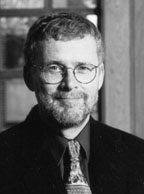 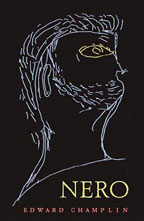 Nero
— Edward Champlin (Harvard). In classics professor Edward
Champlin’s biography of Nero, Roman emperor from 54 to 68 C.E.,
he looks at Nero’s status as a hero in Roman culture. “Much
of what Nero did, distorted by later reports, looks very different
when set in the context of [Nero’s] contemporary norms,”
Champlin says. “One result of this, and the most fun, is that
I get to look at all the stories that make Nero so notorious.”
More (This "more" link will become active with the March
10, 2004 issue.) Nero
— Edward Champlin (Harvard). In classics professor Edward
Champlin’s biography of Nero, Roman emperor from 54 to 68 C.E.,
he looks at Nero’s status as a hero in Roman culture. “Much
of what Nero did, distorted by later reports, looks very different
when set in the context of [Nero’s] contemporary norms,”
Champlin says. “One result of this, and the most fun, is that
I get to look at all the stories that make Nero so notorious.”
More (This "more" link will become active with the March
10, 2004 issue.)
 A
Brief History of the Human Race — Micahel Cook (Norton).
In this overview of the last 10,000 years of human history, Cook
looks at how mankind evolved in the regions of the world. A Brief
History is both a broad investigation of the main lines of human
development and a more focused examination of some cultural trends.
For example, Cook explores Greek pottery, Chinese ancestor cults,
and marriage rites among Australian aborigines. Cook is a professor
of Near Eastern studies. A
Brief History of the Human Race — Micahel Cook (Norton).
In this overview of the last 10,000 years of human history, Cook
looks at how mankind evolved in the regions of the world. A Brief
History is both a broad investigation of the main lines of human
development and a more focused examination of some cultural trends.
For example, Cook explores Greek pottery, Chinese ancestor cults,
and marriage rites among Australian aborigines. Cook is a professor
of Near Eastern studies.
Lawlessness and Economics: Alternative Modes of Governance —
Avinash K. Dixit (Princeton). Dixit examines the theory of private
institutions that transcend or supplement weak economic governance
from the state. Dixit is John J. F. Sherrerd ’52 University
Professor of Economics.
The George W. Bush Presidency Ñ Fred I. Greenstein (Johns Hopkins). Based on a conference that took place at Princeton in 2003, this book analyzes the Bush White House from a number of different perspectives. Greenstein is professor emeritus of political science and director of the Research Program in Leadership Studies at the Woodrow Wilson School of Public and International Affairs.
 The
Great Unraveling: Losing Our Way in the New Century — Paul
Krugman (Norton). In this collection of op-ed columns from the
New York Times and other articles, Krugman chronicles how the boom
economy has unraveled. From tax cuts to the growing deficit, Krugman
blames the Bush administration for the nation’s financial woes.
Krugman is a professor of economics and international affairs. The
Great Unraveling: Losing Our Way in the New Century — Paul
Krugman (Norton). In this collection of op-ed columns from the
New York Times and other articles, Krugman chronicles how the boom
economy has unraveled. From tax cuts to the growing deficit, Krugman
blames the Bush administration for the nation’s financial woes.
Krugman is a professor of economics and international affairs.
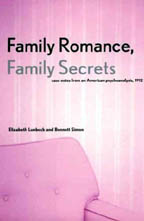 Family
Romance, Family Secrets: Case Notes From An American Psychoanalysis,
1912 — Elizabeth Lunbeck and Bennet Simon (Yale). A collection
of psychoanalyst L.E. Emerson’s notes from his sessions with
a sexually traumatized woman in 1912, this book documents one of
the first uses of psychoanalytic treatment and includes commentary
by Lunbeck and Simon. Lunbeck is a history professor. Family
Romance, Family Secrets: Case Notes From An American Psychoanalysis,
1912 — Elizabeth Lunbeck and Bennet Simon (Yale). A collection
of psychoanalyst L.E. Emerson’s notes from his sessions with
a sexually traumatized woman in 1912, this book documents one of
the first uses of psychoanalytic treatment and includes commentary
by Lunbeck and Simon. Lunbeck is a history professor.
 Beyond
Belief: The Secret Gospel of Thomas — Elaine Pagels (Random
House). An exploration of the origins of Christianity and the consequences
of that history on developing Christian thought. Pagels is a professor
of religion.
More. Beyond
Belief: The Secret Gospel of Thomas — Elaine Pagels (Random
House). An exploration of the origins of Christianity and the consequences
of that history on developing Christian thought. Pagels is a professor
of religion.
More.
Our Affair with El Niño: How We Transformed an Enchanting
Peruvian Current into a Global Climate Hazard — S. George Philander
(Princeton). Philander outlines the history of El Niño,
explores how our perceptions of it were transformed and discusses
how experiences with El Niño can help future generations
cope with global warming. Philander is a professor of geosciences
(meteorology).
The Culture of Islam — Lawrence Rosen (Chicago). An exploration of the continuity, the changes and the challenges that the present-day Muslim world faces today. Rosen is the William Cromwell Professor of Anthropology and an adjunct professor of law at Columbia University.
A New World Order — Anne-Marie Slaughter ’80 (Princeton).
Slaughter argues that not only should we have a new world order
but that we already do if we think of society as governance through
a complex global web of “government networks.” Slaughter
is dean of the Woodrow Wilson School of Public and International
Affairs.
Philosophical Analysis in the Twentieth Century, Volume 1: The
Dawn of Analysis — Scott Soames (Princeton). Volume 1 of
this two-volume set tells the story of analytic philosophy since
1900, the difficulties and disappointments of its development and
the struggle to overcome its core problems. Soames is a philosophy
professor.
Dismantling Democratic States — Ezra Suleiman (Princeton).
Suleiman argues that “government reinvention” has limited
bureaucracy’s capacity to adequately serve the public good
and that a failure to acknowledge the role of an effective bureaucracy
in building and preserving democratic political systems threatens
the survival of democracy itself. Suleiman is a professor of international
studies and of politics and director of the European studies program.
back to top |

 The
Terrorist Mind in Islam and Iraq — Patton Howell ’42
(Saybrook). Explores the relationship between Islam and terrorism
and the role that Westerners play in fostering its development.
Howell is a psychologist in Texas.
The
Terrorist Mind in Islam and Iraq — Patton Howell ’42
(Saybrook). Explores the relationship between Islam and terrorism
and the role that Westerners play in fostering its development.
Howell is a psychologist in Texas.  Locked
In To Life — Patton Howell ’42 and James Hall (Tea
Road). An account of the story of James Hall, victim of The Locked-in
Syndrome, which renders the body useless while the brain is fully
functional. Hall, with Howell’s help, learns to live without
his body. Howell is a forensic psychophysiologist.
Locked
In To Life — Patton Howell ’42 and James Hall (Tea
Road). An account of the story of James Hall, victim of The Locked-in
Syndrome, which renders the body useless while the brain is fully
functional. Hall, with Howell’s help, learns to live without
his body. Howell is a forensic psychophysiologist. Self
Through Art and Science — edited by Patton Howell ’42
and James Hall (1st Books Library). This anthology explores the
edges of personal self in a time of diversity and change. Contributors
explore the changing convergence of science and art in a quest to
understand on what basis one excludes any human’s understanding
of whom he or she is. Howell is a psychophysiologist.
Self
Through Art and Science — edited by Patton Howell ’42
and James Hall (1st Books Library). This anthology explores the
edges of personal self in a time of diversity and change. Contributors
explore the changing convergence of science and art in a quest to
understand on what basis one excludes any human’s understanding
of whom he or she is. Howell is a psychophysiologist. Lenabell:
A Doctor’s Memoir of a Remarkable Woman’s Eighty Year
Battle with Sickle Cell Disease — Hugh Chaplin ’44
(Xlibris). Chaplin discusses his patient of 45 years and the role
she played as an experimental subject for efforts to make sickle-cell
pain crises less frequent and less severe. Chaplin is an emeritus
professor of medicine and pathology at the Washington University
School of Medicine.
Lenabell:
A Doctor’s Memoir of a Remarkable Woman’s Eighty Year
Battle with Sickle Cell Disease — Hugh Chaplin ’44
(Xlibris). Chaplin discusses his patient of 45 years and the role
she played as an experimental subject for efforts to make sickle-cell
pain crises less frequent and less severe. Chaplin is an emeritus
professor of medicine and pathology at the Washington University
School of Medicine. The
Wright Brothers: Inventors of the Airplane — Bernard Ryan Jr.
’46 (Scholastic). Part of Scholastic’s “Great
Life Stories” series, Ryan’s book for children and young
adults gives a concise history of the airplane, the Wright Brothers,
and the results of their historic flight. The book also includes
a timeline and links to related Web sites. Ryan lives in Southbury,
Connecticut.
The
Wright Brothers: Inventors of the Airplane — Bernard Ryan Jr.
’46 (Scholastic). Part of Scholastic’s “Great
Life Stories” series, Ryan’s book for children and young
adults gives a concise history of the airplane, the Wright Brothers,
and the results of their historic flight. The book also includes
a timeline and links to related Web sites. Ryan lives in Southbury,
Connecticut. The
Gravest Danger: Nuclear Weapons — Sidney D. Drell ’47
and James E. Goodby (Hoover Institution). The authors review
policy issues surrounding the nonproliferation of nuclear weapons
and suggest actions that nations, under American leadership, should
take to contain and reduce the danger of nuclear weapons, such as
preventive military action. Drell is a professor emeritus of theoretical
physics at Stanford’s Linear Accelerator Center.
The
Gravest Danger: Nuclear Weapons — Sidney D. Drell ’47
and James E. Goodby (Hoover Institution). The authors review
policy issues surrounding the nonproliferation of nuclear weapons
and suggest actions that nations, under American leadership, should
take to contain and reduce the danger of nuclear weapons, such as
preventive military action. Drell is a professor emeritus of theoretical
physics at Stanford’s Linear Accelerator Center.  Murphy’s
Law Repealed! Everything Turns Out Right … When You Let It—
Charles H. Ware’49 (Charlie’s Law)—The author
presents a self-help guide to finding happiness amid the turmoil
of everyday life through spiritually based techniques. Ware is the
creator of Charlie’s Law, Inc.
Murphy’s
Law Repealed! Everything Turns Out Right … When You Let It—
Charles H. Ware’49 (Charlie’s Law)—The author
presents a self-help guide to finding happiness amid the turmoil
of everyday life through spiritually based techniques. Ware is the
creator of Charlie’s Law, Inc. Adventure
Guide to the Champlain and Hudson River Valleys — Robert Foulke
’52 and Patricia Foulke (Hunter). A travel guide for the
250-mile corridor from New York City to Lake Champlain. The Foulkes
live in Lake George, N.Y.
Adventure
Guide to the Champlain and Hudson River Valleys — Robert Foulke
’52 and Patricia Foulke (Hunter). A travel guide for the
250-mile corridor from New York City to Lake Champlain. The Foulkes
live in Lake George, N.Y. Lincoln
at Cooper Union: The Speech that Made Him President — John
A. Corry ’53 (Xlibris). Corry writes about the political
speech Abraham Lincoln made at New York’s Cooper Union on February
27, 1860, when he was still an Illinois lawyer. The book contains
previously unpublished background material and discusses why this
is the speech Lincoln claimed “made me President.” Corry
lives in New York.
Lincoln
at Cooper Union: The Speech that Made Him President — John
A. Corry ’53 (Xlibris). Corry writes about the political
speech Abraham Lincoln made at New York’s Cooper Union on February
27, 1860, when he was still an Illinois lawyer. The book contains
previously unpublished background material and discusses why this
is the speech Lincoln claimed “made me President.” Corry
lives in New York. Invisible
Giants: The Empires of Cleveland’s Van Sweringen Brothers —
Herbert H. Harwood Jr. ’53 (Indiana University). Biography
of brothers Oris Paxton and Mantis James Van Sweringen, who were
wealthy and powerful industrialists in 1920s America. Harwood is
a railroad historian.
Invisible
Giants: The Empires of Cleveland’s Van Sweringen Brothers —
Herbert H. Harwood Jr. ’53 (Indiana University). Biography
of brothers Oris Paxton and Mantis James Van Sweringen, who were
wealthy and powerful industrialists in 1920s America. Harwood is
a railroad historian. An
Apartment in Paris — Lancelot Farrar ’54 (Farrar).
This memoir recounts a year the author spent in Paris with his wife
and daughter in 1980. In writing about his daily life, Farrar discusses
such topics as the challenges of working in Paris, his bemused frustrations
of the French language, and his family’s relations with local
shopkeepers. Farrar is also the author of several books on German
strategy and policy before and during World War I.
An
Apartment in Paris — Lancelot Farrar ’54 (Farrar).
This memoir recounts a year the author spent in Paris with his wife
and daughter in 1980. In writing about his daily life, Farrar discusses
such topics as the challenges of working in Paris, his bemused frustrations
of the French language, and his family’s relations with local
shopkeepers. Farrar is also the author of several books on German
strategy and policy before and during World War I. Halfway
to Everywhere: A Portrait of America’s First-Tier Suburbs —
William H. Hudnut III ’54 (Urban Land Institute). The author
looks at the country’s first suburbs, built through the middle
of the 20th century, which are experiencing urban-like problems,
including aging infrastructure, population decline, crime, and increasing
poverty. In a series of case studies Hudnut examines how these suburbs
were born, declined, and can be revitalized. A former mayor of Indianapolis,
Hudnut is a senior resident fellow at the Urban Land Institute.
Halfway
to Everywhere: A Portrait of America’s First-Tier Suburbs —
William H. Hudnut III ’54 (Urban Land Institute). The author
looks at the country’s first suburbs, built through the middle
of the 20th century, which are experiencing urban-like problems,
including aging infrastructure, population decline, crime, and increasing
poverty. In a series of case studies Hudnut examines how these suburbs
were born, declined, and can be revitalized. A former mayor of Indianapolis,
Hudnut is a senior resident fellow at the Urban Land Institute. Sermons
That Shaped America: Reformed Preaching from 1630 to 2001 —
edited by William S. Barker ’56 and Samuel T. Logan Jr. ’65
(P & R). A collection of 18 sermons in American history,
including those by John Winthrop, Cotton Mather, Archibald Alexander,
and Timothy Keller. Barker is professor of church history emeritus
at Westminster Theological Seminary. Logan is professor of church
history and president of Westminster Theological Seminary.
Sermons
That Shaped America: Reformed Preaching from 1630 to 2001 —
edited by William S. Barker ’56 and Samuel T. Logan Jr. ’65
(P & R). A collection of 18 sermons in American history,
including those by John Winthrop, Cotton Mather, Archibald Alexander,
and Timothy Keller. Barker is professor of church history emeritus
at Westminster Theological Seminary. Logan is professor of church
history and president of Westminster Theological Seminary. Light
Disguise — David Sofield ’57 (Copper Beech). In Sofield’s
first book of poems, written over the last 30 years, he covers a
range of topics, from the parallels between cleaning up one’s
desk and one’s life, to feelings of hopelessness and elation,
to turning 65 in Vienna. Sofield is an English professor at Amherst
College. His work has been published in the New Yorker, Poetry,
and the New Republic.
Light
Disguise — David Sofield ’57 (Copper Beech). In Sofield’s
first book of poems, written over the last 30 years, he covers a
range of topics, from the parallels between cleaning up one’s
desk and one’s life, to feelings of hopelessness and elation,
to turning 65 in Vienna. Sofield is an English professor at Amherst
College. His work has been published in the New Yorker, Poetry,
and the New Republic.  Seeing
Arabs Through an American School: A Beirut Memoir, 1998-2001 —
Robert F. Ober Jr. ’58. (Xlibris). A memoir of the author’s
stint as president of an American independent school, International
College, in Beirut, Lebanon, serving 3,500 Arab students from preschool
through high school. Ober also discusses the challenges he faced
leading a secular school in a non-secular nation. Ober served in
the U.S. Foreign Service until 1987.
Seeing
Arabs Through an American School: A Beirut Memoir, 1998-2001 —
Robert F. Ober Jr. ’58. (Xlibris). A memoir of the author’s
stint as president of an American independent school, International
College, in Beirut, Lebanon, serving 3,500 Arab students from preschool
through high school. Ober also discusses the challenges he faced
leading a secular school in a non-secular nation. Ober served in
the U.S. Foreign Service until 1987. Fatima’s
Good Fortune — Joanne and Gerry Dryansky ’59 (Miramax).This
husband-and-wife team’s contemporary novel is built around
the life of a Tunisian maid, Fatima, who is summoned to Paris when
her sister, the maid to an exacting countess, dies. At first, Fatima
finds herself baffled by her new life, but soon her luck changes.
Gerry Dryansky is the European editor of Condé Nast Traveler,
based in Paris. Joanne Dryansky is a screenwriter.
Fatima’s
Good Fortune — Joanne and Gerry Dryansky ’59 (Miramax).This
husband-and-wife team’s contemporary novel is built around
the life of a Tunisian maid, Fatima, who is summoned to Paris when
her sister, the maid to an exacting countess, dies. At first, Fatima
finds herself baffled by her new life, but soon her luck changes.
Gerry Dryansky is the European editor of Condé Nast Traveler,
based in Paris. Joanne Dryansky is a screenwriter.
 A
Century of Innovation: Twenty Engineering Achievements that Transformed
Our Lives — George Constable ’63 and Bob Somerville ’78
(Joseph Henry). A Century of Innovation profiles what the authors
consider the most significant inventions, including electricity,
the automobile, and the Internet. For each item, the authors give
a history, an illustrated explanation of how it works, and a timeline
tracing its evolution. Constable is a freelance writer and editor.
Somerville, also a freelancer, worked for 20 years at Time-Life
Books.
A
Century of Innovation: Twenty Engineering Achievements that Transformed
Our Lives — George Constable ’63 and Bob Somerville ’78
(Joseph Henry). A Century of Innovation profiles what the authors
consider the most significant inventions, including electricity,
the automobile, and the Internet. For each item, the authors give
a history, an illustrated explanation of how it works, and a timeline
tracing its evolution. Constable is a freelance writer and editor.
Somerville, also a freelancer, worked for 20 years at Time-Life
Books.  Restructuring
Sovereign Debt: The Case for Ad Hoc Machinery — Lex Rieffel
’63 (Brookings Institution). This book tells how the London
Club originated for the first time, highlighting the pragmatic and
flexible appeal of ad hoc approaches. Rieffel also discusses earlier
proposals for permanent debt restructuring and the reasons they
were not adopted. Rieffel served 18 years with the U.S. Treasury
Department and is currently teaching, consulting, and writing.
Restructuring
Sovereign Debt: The Case for Ad Hoc Machinery — Lex Rieffel
’63 (Brookings Institution). This book tells how the London
Club originated for the first time, highlighting the pragmatic and
flexible appeal of ad hoc approaches. Rieffel also discusses earlier
proposals for permanent debt restructuring and the reasons they
were not adopted. Rieffel served 18 years with the U.S. Treasury
Department and is currently teaching, consulting, and writing. The
Resilient Sector: The State of Nonprofit America — Lester M.
Salamon ’64 (Brookings). An update of The State of Nonprofit
America (2002), this book is an assessment of America’s nonprofit
sector. Salamon argues that business-like approaches are putting
nonprofits at risk and that market pressures hurt the values that
make nonprofits important. Salamon is the director of the Johns
Hopkins Center for Civil Society Studies.
The
Resilient Sector: The State of Nonprofit America — Lester M.
Salamon ’64 (Brookings). An update of The State of Nonprofit
America (2002), this book is an assessment of America’s nonprofit
sector. Salamon argues that business-like approaches are putting
nonprofits at risk and that market pressures hurt the values that
make nonprofits important. Salamon is the director of the Johns
Hopkins Center for Civil Society Studies.
 William
Clark and the Shaping of the West — Landon Y. Jones ’66
(Hill and Wang). Jones tells the story of William Clark, made famous
for his 1804 expedition with Meriwether Lewis. Jones traces Clark’s
life from his childhood in Virginia to his controversial efforts
to reconcile the interests of the federal government, western settlers,
and Native Americans some 30 years after his famous expedition.
Jones is a board member of the National Council of the Lewis and
Clark Bicentennial.
William
Clark and the Shaping of the West — Landon Y. Jones ’66
(Hill and Wang). Jones tells the story of William Clark, made famous
for his 1804 expedition with Meriwether Lewis. Jones traces Clark’s
life from his childhood in Virginia to his controversial efforts
to reconcile the interests of the federal government, western settlers,
and Native Americans some 30 years after his famous expedition.
Jones is a board member of the National Council of the Lewis and
Clark Bicentennial.
 The
Heretic — Lewis Weinstein ’66 (University of Wisconsin).
A historical novel about a secretly Jewish family in Inquisition
Spain. This paperback edition contains a new afterword by the author.
Weinstein is a writer and businessman living in Manhattan and Ocean
City, NJ.
The
Heretic — Lewis Weinstein ’66 (University of Wisconsin).
A historical novel about a secretly Jewish family in Inquisition
Spain. This paperback edition contains a new afterword by the author.
Weinstein is a writer and businessman living in Manhattan and Ocean
City, NJ.  Cruise
Ship Doctor — Gerry Yukevich ’68 (Publish America).
This novel tells the tale of Oliver Loring, M.D., a Harvard emergency
physician, amorous bachelor, and expert ballroom dancer, who takes
a job in the Caribbean on the legendary cruise ship the S/S Nordic
Blue during its weeklong “Valentine TV Cruise.” Yukevich
practices emergency medicine in Martha’s Vineyard.
Cruise
Ship Doctor — Gerry Yukevich ’68 (Publish America).
This novel tells the tale of Oliver Loring, M.D., a Harvard emergency
physician, amorous bachelor, and expert ballroom dancer, who takes
a job in the Caribbean on the legendary cruise ship the S/S Nordic
Blue during its weeklong “Valentine TV Cruise.” Yukevich
practices emergency medicine in Martha’s Vineyard. San
Francisco Bay: Portrait of an Estuary — John Hart ’70,
photographs by David Sanger (California). Hart explores San Francisco
Bay’s history, including its ecology and urban and industrial
development. The bay, with an inland delta, is one of the largest
estuaries in the Americas and one of the most degraded. The book
describes the local movement to save the bay. Hart is an editor
for the literary magazine Blue Unicorn.
San
Francisco Bay: Portrait of an Estuary — John Hart ’70,
photographs by David Sanger (California). Hart explores San Francisco
Bay’s history, including its ecology and urban and industrial
development. The bay, with an inland delta, is one of the largest
estuaries in the Americas and one of the most degraded. The book
describes the local movement to save the bay. Hart is an editor
for the literary magazine Blue Unicorn.
 Reunion
— Alan Lightman ’70 (at right) (Pantheon). In Reunion,
Lightman’s fourth novel, he tells the story of Charles, Class
of 1969 at an all-male East Coast college that resembles Princeton,
and Juliana, a beautiful and driven New York ballet dancer Charles
met in a coffee shop.
Reunion
— Alan Lightman ’70 (at right) (Pantheon). In Reunion,
Lightman’s fourth novel, he tells the story of Charles, Class
of 1969 at an all-male East Coast college that resembles Princeton,
and Juliana, a beautiful and driven New York ballet dancer Charles
met in a coffee shop.  Beyond
the Front Lines: How the News Media Cover a World Shaped by War
— Philip Seib ’70 (Palgrave Macmillan). Seib (left)
analyzes the performance of news media in Iraq and elsewhere and
offers solutions for providing more balanced, independent news during
wartime. Seib is the Lucius W. Nieman Professor of Journalism at
Marquette University.
Beyond
the Front Lines: How the News Media Cover a World Shaped by War
— Philip Seib ’70 (Palgrave Macmillan). Seib (left)
analyzes the performance of news media in Iraq and elsewhere and
offers solutions for providing more balanced, independent news during
wartime. Seib is the Lucius W. Nieman Professor of Journalism at
Marquette University. The
Player: Christy Mathewson, Baseball and the American Century —
Philip Seib ’70 (Four Walls Eight Windows). Philip Seib
’70 (left) resurrects New York Giants pitcher Christy Mathewson.
The
Player: Christy Mathewson, Baseball and the American Century —
Philip Seib ’70 (Four Walls Eight Windows). Philip Seib
’70 (left) resurrects New York Giants pitcher Christy Mathewson. Who
Owns Native Culture? — Michael F. Brown ’72 (Harvard).
This book introduces the question of cultural ownership through
discussion of several cases in which indigenous populations have
confronted settlers over the usurpation of their cultural heritage.
Brown is a professor of anthropology and Latin American studies
at Williams College.
Who
Owns Native Culture? — Michael F. Brown ’72 (Harvard).
This book introduces the question of cultural ownership through
discussion of several cases in which indigenous populations have
confronted settlers over the usurpation of their cultural heritage.
Brown is a professor of anthropology and Latin American studies
at Williams College.
 Images
of America: Philadelphia Graveyards and Cemeteries — Thomas
H. Keels ’76 (Arcadia). As part of an Images of America
series, Keels explores the final resting places of different social
and cultural groups and points out how differences in beliefs and
lifestyle are often reflected in burial practices and monument designs.
The book includes more than 200 photographs of sites. Keels is a
writer and historian living in Lafayette Hill, Pa.
Images
of America: Philadelphia Graveyards and Cemeteries — Thomas
H. Keels ’76 (Arcadia). As part of an Images of America
series, Keels explores the final resting places of different social
and cultural groups and points out how differences in beliefs and
lifestyle are often reflected in burial practices and monument designs.
The book includes more than 200 photographs of sites. Keels is a
writer and historian living in Lafayette Hill, Pa. American
Synagogues: A Century of Architecture and Jewish Community —
Samuel D. Gruber ’77 (Rizzoli). In this survey of 20th-century
American synagogues, Gruber explores how the history of the Jewish
people is expressed in synagogue design. The author looks at 35
houses of worship, including Beth Sholom Synagogue in Elkins Park,
Pennsylvania, designed by Frank Lloyd Wright in 1957. Color photos
by Paul Rocheleau accompany the text. Gruber teaches in the Judaic
studies program at Syracuse University and is president of the International
Survey of Jewish Monuments.
American
Synagogues: A Century of Architecture and Jewish Community —
Samuel D. Gruber ’77 (Rizzoli). In this survey of 20th-century
American synagogues, Gruber explores how the history of the Jewish
people is expressed in synagogue design. The author looks at 35
houses of worship, including Beth Sholom Synagogue in Elkins Park,
Pennsylvania, designed by Frank Lloyd Wright in 1957. Color photos
by Paul Rocheleau accompany the text. Gruber teaches in the Judaic
studies program at Syracuse University and is president of the International
Survey of Jewish Monuments. The
Art of the Limoges Box — Nancy du Tertre ’78 (Abrams).
A designer of Limoges boxes, du Tertre traces the Limoges lineage
from snuffboxes to vessels for love notes to collector’s items.
For collectors, she also includes tips on finding the best boxes.
Du Tertre is part-owner of the manufacturer Artoria Limoges in Limoges,
France.
The
Art of the Limoges Box — Nancy du Tertre ’78 (Abrams).
A designer of Limoges boxes, du Tertre traces the Limoges lineage
from snuffboxes to vessels for love notes to collector’s items.
For collectors, she also includes tips on finding the best boxes.
Du Tertre is part-owner of the manufacturer Artoria Limoges in Limoges,
France.  Cool
Men and the Second Sex — Susan Fraiman ’78 (Columbia).
In this feminist critique, Fraiman defines “cool men”
as those who rebel against a mainstream defined as maternal. She
cites such figures as Henry Louis Gates Jr. and Quentin Tarantino
as examples of men who resist the authority of women and, as a result,
ignore the thoughts of feminist thinkers, sometimes devaluing women
in favor of men and masculinity. Fraiman is an English professor
at the University of Virginia.
Cool
Men and the Second Sex — Susan Fraiman ’78 (Columbia).
In this feminist critique, Fraiman defines “cool men”
as those who rebel against a mainstream defined as maternal. She
cites such figures as Henry Louis Gates Jr. and Quentin Tarantino
as examples of men who resist the authority of women and, as a result,
ignore the thoughts of feminist thinkers, sometimes devaluing women
in favor of men and masculinity. Fraiman is an English professor
at the University of Virginia.
 The
Edge of Surrealism: A Roger Caillois Reader — edited by Claudine
Frank ’78 (Duke). Comprehensive collection of the writings
of Roger Caillois, a French social theorist who focused on modern
intellectual life and Surrealism. The editor’s introductory
essay serves to situate Caillois’ writings intellectually and
historically. Frank is an assistant professor of French at Barnard
College.
The
Edge of Surrealism: A Roger Caillois Reader — edited by Claudine
Frank ’78 (Duke). Comprehensive collection of the writings
of Roger Caillois, a French social theorist who focused on modern
intellectual life and Surrealism. The editor’s introductory
essay serves to situate Caillois’ writings intellectually and
historically. Frank is an assistant professor of French at Barnard
College.
 Separation
of Church and State — Philip Hamburger ’79 (Harvard).
Hamburger argues that the separation of church and state has no
historical foundation in the First Amendment. Although Thomas Jefferson
and others retrospectively claimed that the First Amendment separated
church and state, separation became part of American constitutional
law only much later. Hamburger is John P. Wilson Professor of Law
at the University of Chicago.
Separation
of Church and State — Philip Hamburger ’79 (Harvard).
Hamburger argues that the separation of church and state has no
historical foundation in the First Amendment. Although Thomas Jefferson
and others retrospectively claimed that the First Amendment separated
church and state, separation became part of American constitutional
law only much later. Hamburger is John P. Wilson Professor of Law
at the University of Chicago. A
Season in Bethlehem: Unholy War in a Sacred Place — Joshua
Hammer ’79 ( Free Press). Hammer, in his second nonfiction
book — introduces 21 real-life dramatis personae caught up
in the Israeli-Palestinian conflict. His aim: to go deeper than
the day-to-day violence he was covering as Newsweek’s
Jerusalem-based Middle East bureau chief. The book is mainly a reconstruction
of events, pieced together from interviews conducted in the summer
and fall of 2002 after a U.S.-European-brokered compromise ended
a 39-day standoff between Palestinian gunmen and Israeli soldiers
at Bethlehem’s Church of the Nativity.
A
Season in Bethlehem: Unholy War in a Sacred Place — Joshua
Hammer ’79 ( Free Press). Hammer, in his second nonfiction
book — introduces 21 real-life dramatis personae caught up
in the Israeli-Palestinian conflict. His aim: to go deeper than
the day-to-day violence he was covering as Newsweek’s
Jerusalem-based Middle East bureau chief. The book is mainly a reconstruction
of events, pieced together from interviews conducted in the summer
and fall of 2002 after a U.S.-European-brokered compromise ended
a 39-day standoff between Palestinian gunmen and Israeli soldiers
at Bethlehem’s Church of the Nativity.
 Women
Don’t Ask: Negotiation and the Gender Divide — Sara Laschever
’79 (Princeton). Laschever, a journalist from Somerville,
Massachusetts, and coauthor Linda Babcock, an economist at Carnegie
Mellon University, examine the societal and personal reasons that
many women are averse to negotiating on their own behalf and fail
to realize that certain situations are negotiable at all. The results
of this phenomenon are stark, according to the authors: Women who
fail to negotiate for their initial salary can lose hundreds of
thousands of dollars over the course of a lifetime.
Women
Don’t Ask: Negotiation and the Gender Divide — Sara Laschever
’79 (Princeton). Laschever, a journalist from Somerville,
Massachusetts, and coauthor Linda Babcock, an economist at Carnegie
Mellon University, examine the societal and personal reasons that
many women are averse to negotiating on their own behalf and fail
to realize that certain situations are negotiable at all. The results
of this phenomenon are stark, according to the authors: Women who
fail to negotiate for their initial salary can lose hundreds of
thousands of dollars over the course of a lifetime.  In
Praise of Nepotism: A Natural History — Adam Bellow ’80
(Doubleday). In his first book, Bellow delivers a straight history
of nepotistic practices through the ages, from King David’s
vow in the 10th century B.C.E. that the son of his wife, Bathsheba,
would succeed him, to Joseph Kennedy’s machinations on behalf
of his sons’ careers. But Bellow’s central thesis is that
a “new nepotism” is on the rise in American public life
and that this may help to balance our excessive faith in the concept
of pure meritocracy.
In
Praise of Nepotism: A Natural History — Adam Bellow ’80
(Doubleday). In his first book, Bellow delivers a straight history
of nepotistic practices through the ages, from King David’s
vow in the 10th century B.C.E. that the son of his wife, Bathsheba,
would succeed him, to Joseph Kennedy’s machinations on behalf
of his sons’ careers. But Bellow’s central thesis is that
a “new nepotism” is on the rise in American public life
and that this may help to balance our excessive faith in the concept
of pure meritocracy.  The
Smartest Guys in the Room: The Amazing Rise and Scandalous Fall
of Enron — Peter Elkind ’80 and Bethany McLean (Portfolio).
Using private e-mails, court records, board minutes, and interviews,
the authors explore Enron’s leaders’s shady finances and
corrupt corporate culture. What brought Enron down, they write,
was more complex than simple thievery. The company was run by people
who thought they were the smartest guys in any room, but who were
bad business managers. Elkind and McLean are senior writers at Fortune.
The
Smartest Guys in the Room: The Amazing Rise and Scandalous Fall
of Enron — Peter Elkind ’80 and Bethany McLean (Portfolio).
Using private e-mails, court records, board minutes, and interviews,
the authors explore Enron’s leaders’s shady finances and
corrupt corporate culture. What brought Enron down, they write,
was more complex than simple thievery. The company was run by people
who thought they were the smartest guys in any room, but who were
bad business managers. Elkind and McLean are senior writers at Fortune.
 Moneyball:
The Art of Winning an Unfair Game — Michael Lewis ’82
(W. W. Norton). Lewis recounts the story of Major League Baseball
general manager Billy Beane and the Oakland Athletics, one of the
poorest teams in the sport. Working with a group of undervalued
players, Beane, in 2002, was able to turn the Athletics into a winning
team. He uncovered talent by analyzing statistics collected by amateur
baseball enthusiasts instead of relying on traditional methods of
scouting players and the wisdom of those in the front office. Lewis
is the author of Liar’s Poker (1989).
Moneyball:
The Art of Winning an Unfair Game — Michael Lewis ’82
(W. W. Norton). Lewis recounts the story of Major League Baseball
general manager Billy Beane and the Oakland Athletics, one of the
poorest teams in the sport. Working with a group of undervalued
players, Beane, in 2002, was able to turn the Athletics into a winning
team. He uncovered talent by analyzing statistics collected by amateur
baseball enthusiasts instead of relying on traditional methods of
scouting players and the wisdom of those in the front office. Lewis
is the author of Liar’s Poker (1989). A
Time of Our Choosing: America’s War in Iraq — Todd S.
Purdum ’82 and the staff of the New York Times (Times
Books). This book uses Purdum’s reporting and Times interviews
with key figures to tell a comprehensive story of the war in Iraq—from
the new war plan outlined by Rumsfeld, to the diplomatic recriminations
at the United Nations, to the battles themselves and their aftermath.
It also explores the legacy of America’s near-unilateral action
and how America’s choices have transformed the world. Purdum
is a correspondent in the Washington bureau of the New York Times.
A
Time of Our Choosing: America’s War in Iraq — Todd S.
Purdum ’82 and the staff of the New York Times (Times
Books). This book uses Purdum’s reporting and Times interviews
with key figures to tell a comprehensive story of the war in Iraq—from
the new war plan outlined by Rumsfeld, to the diplomatic recriminations
at the United Nations, to the battles themselves and their aftermath.
It also explores the legacy of America’s near-unilateral action
and how America’s choices have transformed the world. Purdum
is a correspondent in the Washington bureau of the New York Times.
 The
Marriage of the Sea — Jane Alison ’83 (Farrar, Straus
& Giroux). Alison’s novel follows sets of characters whose
lives cross on interwoven paths of love and loneliness, between
New Orleans and Venice. At the center of it all is Oswaldo, a Venetian
art patron, whose grants, commissions, and avuncular generosity
draw Lucinda, Vera, and Anton to Venice. Meanwhile, Anton’s
emotionally fragile wife and Lucinda’s suitor await their return
in New Orleans, while Vera’s ex-boyfriend roams Venice with
his new lover. Alison is the author of The Love-Artist (2001) and
lives in Germany.
The
Marriage of the Sea — Jane Alison ’83 (Farrar, Straus
& Giroux). Alison’s novel follows sets of characters whose
lives cross on interwoven paths of love and loneliness, between
New Orleans and Venice. At the center of it all is Oswaldo, a Venetian
art patron, whose grants, commissions, and avuncular generosity
draw Lucinda, Vera, and Anton to Venice. Meanwhile, Anton’s
emotionally fragile wife and Lucinda’s suitor await their return
in New Orleans, while Vera’s ex-boyfriend roams Venice with
his new lover. Alison is the author of The Love-Artist (2001) and
lives in Germany. Bibliophilia:
A Novella and Stories — Michael Griffith ’87 (Arcade).
In this, Griffith’s second book, he creates a carnival of characters
ensnared in comic situations: A hair doctor who goes bald. An English
professor trapped in a monkey cage. A librarian who polices the
stacks for chastity’s sake.
Bibliophilia:
A Novella and Stories — Michael Griffith ’87 (Arcade).
In this, Griffith’s second book, he creates a carnival of characters
ensnared in comic situations: A hair doctor who goes bald. An English
professor trapped in a monkey cage. A librarian who polices the
stacks for chastity’s sake.  The
Big Fix: How the Pharmaceutical Industry Rips Off American Consumers
— Katharine Greider ’88 (PublicAffairs). The author
points a finger at the drug industry, which, she argues, exploits
customers with high prices and seductive marketing — creating
demand for drugs that many people can’t afford and may not
even need. She also looks at government regulation of the industry.
Greider is a journalist in New York City.
The
Big Fix: How the Pharmaceutical Industry Rips Off American Consumers
— Katharine Greider ’88 (PublicAffairs). The author
points a finger at the drug industry, which, she argues, exploits
customers with high prices and seductive marketing — creating
demand for drugs that many people can’t afford and may not
even need. She also looks at government regulation of the industry.
Greider is a journalist in New York City. A
Courtship after Marriage: Sexuality and Love in Mexican Transnational
Families — Jennifer S. Hirsch ’88 (University of California).
By focusing on Mexican marriages in Atlanta and in a small Mexican
town, author examines the changing sexual and partnership roles
for today’s immigrant Mexican family. Hirsch is an assistant
professor of international health and anthropology at Emory University.
A
Courtship after Marriage: Sexuality and Love in Mexican Transnational
Families — Jennifer S. Hirsch ’88 (University of California).
By focusing on Mexican marriages in Atlanta and in a small Mexican
town, author examines the changing sexual and partnership roles
for today’s immigrant Mexican family. Hirsch is an assistant
professor of international health and anthropology at Emory University.
 Andrew
Young: Civil Rights Ambassador — Andrew J. DeRoche ’89
(Scholarly Resources). DeRoche explores the rising influence
of race in foreign relations as he examines the contributions of
Young, an African-American activist, politician, and diplomat to
U.S. foreign policy. DeRoche teaches history at Front Range Community
College in Longmont, Colorado.
Andrew
Young: Civil Rights Ambassador — Andrew J. DeRoche ’89
(Scholarly Resources). DeRoche explores the rising influence
of race in foreign relations as he examines the contributions of
Young, an African-American activist, politician, and diplomat to
U.S. foreign policy. DeRoche teaches history at Front Range Community
College in Longmont, Colorado. Abandoned
Women: Rewriting the Classics in Dante, Boccaccio, and Chaucer —
Suzanne Hagedorn ’89 (University of Michigan). Focusing
on the vernacular works of Dante, Boccaccio, and Chaucer, the author
argues that revisiting the classical tradition of the abandoned
woman enables these medieval authors to reconsider ancient epics
and myths from a female perspective and question assumptions about
gender roles in medieval literature. Hagedorn is an associate professor
of English at the College of William and Mary.
Abandoned
Women: Rewriting the Classics in Dante, Boccaccio, and Chaucer —
Suzanne Hagedorn ’89 (University of Michigan). Focusing
on the vernacular works of Dante, Boccaccio, and Chaucer, the author
argues that revisiting the classical tradition of the abandoned
woman enables these medieval authors to reconsider ancient epics
and myths from a female perspective and question assumptions about
gender roles in medieval literature. Hagedorn is an associate professor
of English at the College of William and Mary.
 When
You Say Yes but Mean No: How Silencing Conflict Wrecks Relationships
and Companies . . . and What You Can Do About It — Leslie Perlow
’89 (Crown). In her second book, Perlow, an ethnographer,
examines how problems arising in business could be avoided if only
people spoke their minds.
When
You Say Yes but Mean No: How Silencing Conflict Wrecks Relationships
and Companies . . . and What You Can Do About It — Leslie Perlow
’89 (Crown). In her second book, Perlow, an ethnographer,
examines how problems arising in business could be avoided if only
people spoke their minds. 
 The
Family CFO: The Couple’s Business Plan for Love and Money —
Mary Claire Allvine ’90 and Christine Larson ’90 (Rodale).
This advice book shows readers how to manage cash flow and investments,
divide responsibilities, prioritize goals, and focus on realizing
dreams.
The
Family CFO: The Couple’s Business Plan for Love and Money —
Mary Claire Allvine ’90 and Christine Larson ’90 (Rodale).
This advice book shows readers how to manage cash flow and investments,
divide responsibilities, prioritize goals, and focus on realizing
dreams.  The
Founding Fathers & the Politics of Character — Andrew S.
Trees ’90 (Princeton). Through the writings of Thomas Jefferson,
John Adams, Alexander Hamilton, and James Madison, Trees examines
four attempts to answer the question of national identity that Americans
faced in the wake of the American Revolution. Trees teaches at the
Horace Mann School in New York City.
The
Founding Fathers & the Politics of Character — Andrew S.
Trees ’90 (Princeton). Through the writings of Thomas Jefferson,
John Adams, Alexander Hamilton, and James Madison, Trees examines
four attempts to answer the question of national identity that Americans
faced in the wake of the American Revolution. Trees teaches at the
Horace Mann School in New York City. Barter
— Monica Youn ’93 (Graywolf ). The volume of 42 poems
is Youn’s first book of poetry. Youn is an entertainment lawyer
in Manhattan.
Barter
— Monica Youn ’93 (Graywolf ). The volume of 42 poems
is Youn’s first book of poetry. Youn is an entertainment lawyer
in Manhattan.  Nerve’s
Guide to Sex Etiquette for Ladies and Gentlemen — Emma Taylor
’95 and Lorelei Sharkey (Plume). This guide to dating and
relationships covers such topics as how to make the first move,
table manners, and the proper Valentine’s Day conduct. Taylor
also coauthored The Big Bang: Nerve’s Guide to the New Sexual
Universe.
Nerve’s
Guide to Sex Etiquette for Ladies and Gentlemen — Emma Taylor
’95 and Lorelei Sharkey (Plume). This guide to dating and
relationships covers such topics as how to make the first move,
table manners, and the proper Valentine’s Day conduct. Taylor
also coauthored The Big Bang: Nerve’s Guide to the New Sexual
Universe. Sub
4:00: Alan Webb and the Quest for the Fastest Mile — Chris
Lear ’96 (Rodale). Lear chronicles Webb’s freshman
year at the University of Michigan as Webb deals with injuries,
the politics of collegiate track, and media scrutiny that comes
with being the fastest high-school miler ever. Lear also wrote Running
with the Buffaloes.
Sub
4:00: Alan Webb and the Quest for the Fastest Mile — Chris
Lear ’96 (Rodale). Lear chronicles Webb’s freshman
year at the University of Michigan as Webb deals with injuries,
the politics of collegiate track, and media scrutiny that comes
with being the fastest high-school miler ever. Lear also wrote Running
with the Buffaloes. All
That’s Holy: A Young Guy, an Old Car, and the Search for God
in America — Tom Levinson ’96 (Jossey-Bass). Recounts
the author’s road trip across the country in search of understanding
of American spirituality. He creates a portrait of America’s
broad spectrum of religious identities and in the process finds
understanding of his own spiritual life. Levinson is a law student
at the University of Chicago.
All
That’s Holy: A Young Guy, an Old Car, and the Search for God
in America — Tom Levinson ’96 (Jossey-Bass). Recounts
the author’s road trip across the country in search of understanding
of American spirituality. He creates a portrait of America’s
broad spectrum of religious identities and in the process finds
understanding of his own spiritual life. Levinson is a law student
at the University of Chicago. Conditioning
for Baseball — Mat Brzycki and Pete Silletti ’96 (Cardinal).
A comprehensive book on all aspects of baseball training, including
skill training, aerobic and anaerobic conditioning, flexibility,
strength training, nutrition, and agility. Silletti is an assistant
baseball coach at Princeton.
Conditioning
for Baseball — Mat Brzycki and Pete Silletti ’96 (Cardinal).
A comprehensive book on all aspects of baseball training, including
skill training, aerobic and anaerobic conditioning, flexibility,
strength training, nutrition, and agility. Silletti is an assistant
baseball coach at Princeton. Corporate
Warriors: The Rise of the Privatized Military Industry — P.
W. Singer ’97 (Cornell). The author examines a recent development
in modern warfare: private companies offering specialized military
services for hire. Private military firms range from consulting
firms that sell the strategic advice of retired generals to corporations
that lease out trained commando teams. Singer looks at the risks
that come from outsourcing national security. Singer is a fellow
in foreign policy studies at the Brookings Institution.
Corporate
Warriors: The Rise of the Privatized Military Industry — P.
W. Singer ’97 (Cornell). The author examines a recent development
in modern warfare: private companies offering specialized military
services for hire. Private military firms range from consulting
firms that sell the strategic advice of retired generals to corporations
that lease out trained commando teams. Singer looks at the risks
that come from outsourcing national security. Singer is a fellow
in foreign policy studies at the Brookings Institution.  Empire
of Light — David Czuchlewski ’98 (Putnam). Czuchlewski’s
second novel,
Empire
of Light — David Czuchlewski ’98 (Putnam). Czuchlewski’s
second novel,  Another
Quiet American: Stories of Life in Laos — Brett Dakin ’98
(Asia Books). Based on his Princeton in Asia experience, Dakin
describes his two-years working as a language and marketing consultant
at the National Tourism Authority of the Lao People’s Democratic
Republic. Dakin is a student at Harvard Law School.
Another
Quiet American: Stories of Life in Laos — Brett Dakin ’98
(Asia Books). Based on his Princeton in Asia experience, Dakin
describes his two-years working as a language and marketing consultant
at the National Tourism Authority of the Lao People’s Democratic
Republic. Dakin is a student at Harvard Law School. The
Book of Motion — Tung-Hui Hu ’98 (University of Georgia).
Originally Hu’s senior thesis, this book is a collection of
poems about climbing a hill, love, and growing up among other subjects.
Hu is a doctoral student in architecture at the University of California,
Berkeley.
The
Book of Motion — Tung-Hui Hu ’98 (University of Georgia).
Originally Hu’s senior thesis, this book is a collection of
poems about climbing a hill, love, and growing up among other subjects.
Hu is a doctoral student in architecture at the University of California,
Berkeley. Wild
East: Stories from the Last Frontier — edited by Boris Fishman
’01 (Justin, Charles & Co.). This anthology of short
fiction about the former Soviet Union and Eastern Europe gathers
stories by 12 young authors — émigrés to the
West and Americans abroad — writing about the region today.
The collection includes a story about a staged love affair between
a C.I.A. agent and a Czech intelligence officer and a story about
the victims of Russia’s war in Chechnya. Fishman is on the
editorial staff of the New Yorker.
Wild
East: Stories from the Last Frontier — edited by Boris Fishman
’01 (Justin, Charles & Co.). This anthology of short
fiction about the former Soviet Union and Eastern Europe gathers
stories by 12 young authors — émigrés to the
West and Americans abroad — writing about the region today.
The collection includes a story about a staged love affair between
a C.I.A. agent and a Czech intelligence officer and a story about
the victims of Russia’s war in Chechnya. Fishman is on the
editorial staff of the New Yorker.  The
New Economy — Roger Alcaly *69 (Farrar, Straus & Giroux).
Alcaly describes how the American economy has changed over the last
few decades of the 20th century in response to new technologies,
global competition, and innovations in world financial markets.
These changes will result in increased productivity and prosperity,
he argues, but the evolution of a “new economy” can be
a slow and erratic process. Alcaly is a hedge-fund manager and an
economist.
The
New Economy — Roger Alcaly *69 (Farrar, Straus & Giroux).
Alcaly describes how the American economy has changed over the last
few decades of the 20th century in response to new technologies,
global competition, and innovations in world financial markets.
These changes will result in increased productivity and prosperity,
he argues, but the evolution of a “new economy” can be
a slow and erratic process. Alcaly is a hedge-fund manager and an
economist.
 Reclaiming
the Game: College Sports and Educational Values —William G.
Bowen *58 and Sarah A. Levin (Princeton). This study, which
builds on Bowen’s book The Game of Life (2001), looks at the
widening divide between the academic mission of elite colleges and
universities, and the role of athletics on campus. Bowen and Levin
advocate reducing the number of recruited athletes and raising academic
standards for them, among other reforms. A former president of Princeton,
Bowen is president of the Andrew W. Mellon Foundation. Levin is
a graduate student at the Harvard School of Public Health. An interview
with Bowen is planned for a future issue of PAW.
Reclaiming
the Game: College Sports and Educational Values —William G.
Bowen *58 and Sarah A. Levin (Princeton). This study, which
builds on Bowen’s book The Game of Life (2001), looks at the
widening divide between the academic mission of elite colleges and
universities, and the role of athletics on campus. Bowen and Levin
advocate reducing the number of recruited athletes and raising academic
standards for them, among other reforms. A former president of Princeton,
Bowen is president of the Andrew W. Mellon Foundation. Levin is
a graduate student at the Harvard School of Public Health. An interview
with Bowen is planned for a future issue of PAW.
 Employment
with a Human Face: Balancing Efficiency, Equity, and Voice —
John W. Budd *91 (Cornell University). Budd calls into question
traditional objectives of employment — efficiency, productivity,
and competition — and argues that human concerns like equity
and voice need to be factored into the root of employment aims.
Budd is Industrial Relations Landgrant Term Professor at the Carlson
School of Management, University of Minnesota.
Employment
with a Human Face: Balancing Efficiency, Equity, and Voice —
John W. Budd *91 (Cornell University). Budd calls into question
traditional objectives of employment — efficiency, productivity,
and competition — and argues that human concerns like equity
and voice need to be factored into the root of employment aims.
Budd is Industrial Relations Landgrant Term Professor at the Carlson
School of Management, University of Minnesota.
 Green
Desire: Imagining Early Modern English Gardens — Rebecca Bushnell
*83 (Cornell). Bushnell describes the innovate design of old
gardening manuals, examining how writers and printers marketed them
as fiction as well as practical advice for aspiring gardeners. Bushnell
is a professor of English and dean of the college at the University
of Pennsylvania.
Green
Desire: Imagining Early Modern English Gardens — Rebecca Bushnell
*83 (Cornell). Bushnell describes the innovate design of old
gardening manuals, examining how writers and printers marketed them
as fiction as well as practical advice for aspiring gardeners. Bushnell
is a professor of English and dean of the college at the University
of Pennsylvania.
 The
Work of the Sun: New and Selected Poems, 1991-2002 — Charles
Edward Eaton *37 (Cornwall Books). This collection includes
selections from Eaton’s published poems of the last 15 years,
as well as over 30 new poems. Eaton writes on such subjects as loneliness,
love affairs, and memory. Eaton lives in Chapel Hill, North Carolina.
The
Work of the Sun: New and Selected Poems, 1991-2002 — Charles
Edward Eaton *37 (Cornwall Books). This collection includes
selections from Eaton’s published poems of the last 15 years,
as well as over 30 new poems. Eaton writes on such subjects as loneliness,
love affairs, and memory. Eaton lives in Chapel Hill, North Carolina.
 The
Plaza Mayor and the Shaping of Baroque Madrid — Jesús
Escobar *96 (Cambridge). This book examines the transformation
of Madrid from a secondary market town to the capital of the worldwide
Spanish Habsburg empire. Escobar discusses how the shaping of the
city’s square, Plaza Mayor, reflects the bureaucratic nature
of government in Madrid. Escobar is an associate professor of art
history at Fairfield University.
The
Plaza Mayor and the Shaping of Baroque Madrid — Jesús
Escobar *96 (Cambridge). This book examines the transformation
of Madrid from a secondary market town to the capital of the worldwide
Spanish Habsburg empire. Escobar discusses how the shaping of the
city’s square, Plaza Mayor, reflects the bureaucratic nature
of government in Madrid. Escobar is an associate professor of art
history at Fairfield University.
 Somebodies
and Nobodies: Overcoming the Abuse of Rank — Robert W. Fuller
*61 (New Society). This book identifies a form of discrimination
called “rankism,” the abuse of power by high-ranking individuals
and the indignity and humiliation it causes people of lower rank.
Rankism, argues the author, underlies many facets of society, from
personal relationships to international relations. Fuller is a former
president of Oberlin College.
Somebodies
and Nobodies: Overcoming the Abuse of Rank — Robert W. Fuller
*61 (New Society). This book identifies a form of discrimination
called “rankism,” the abuse of power by high-ranking individuals
and the indignity and humiliation it causes people of lower rank.
Rankism, argues the author, underlies many facets of society, from
personal relationships to international relations. Fuller is a former
president of Oberlin College.
 Captors
and Captives: The 1704 French and Indian Raid on Deerfield —
Evan Haefeli *00 and Kevin Sweeney (University of Massachusetts
Press). Haefeli and Sweeney examine the 1704 attack on the Massachusetts
village of Deerfield by a party of French and Indian raiders. The
authors reconstruct the battle from several viewpoints and describe
a number of possible reasons the attack occurred. Haefeli is assistant
professor of history at Tufts University.
Captors
and Captives: The 1704 French and Indian Raid on Deerfield —
Evan Haefeli *00 and Kevin Sweeney (University of Massachusetts
Press). Haefeli and Sweeney examine the 1704 attack on the Massachusetts
village of Deerfield by a party of French and Indian raiders. The
authors reconstruct the battle from several viewpoints and describe
a number of possible reasons the attack occurred. Haefeli is assistant
professor of history at Tufts University.
 The
Education of Historians for the Twenty-first Century — Philip
M. Katz *94, Colin Palmer, Thomas Bender, and the Committee
on Graduate Education of the American Historical Association (University
of Illinois). A comprehensive investigation and report on the state
of graduate programs in history. The book explains the study’s
results and offers recommendations for improving graduate education.
Katz is the research director for graduate education at the American
Historical Association. Palmer is Dodge Professor of History at
Princeton and chair of the A.H.A. Committee on Graduate Education.
The
Education of Historians for the Twenty-first Century — Philip
M. Katz *94, Colin Palmer, Thomas Bender, and the Committee
on Graduate Education of the American Historical Association (University
of Illinois). A comprehensive investigation and report on the state
of graduate programs in history. The book explains the study’s
results and offers recommendations for improving graduate education.
Katz is the research director for graduate education at the American
Historical Association. Palmer is Dodge Professor of History at
Princeton and chair of the A.H.A. Committee on Graduate Education.
 A
Death in Washington: Walter G. Krivitsky and the Stalin Terror —
Gary Kern *69 (Enigma). Kern investigates the career of Krivitsky,
a Soviet superspy who, disillusioned by Stalin’s purges, defected
in 1937 and escaped to France and then the U.S. Using archival sources,
Kern also explores Krivitsky’s death in 1941, officially ruled
a suicide, but suspected by many to be a revenge killing ordered
by Stalin. Kern is a translator and specialist in Russian literature.
By Lucia S. Smith ’04
A
Death in Washington: Walter G. Krivitsky and the Stalin Terror —
Gary Kern *69 (Enigma). Kern investigates the career of Krivitsky,
a Soviet superspy who, disillusioned by Stalin’s purges, defected
in 1937 and escaped to France and then the U.S. Using archival sources,
Kern also explores Krivitsky’s death in 1941, officially ruled
a suicide, but suspected by many to be a revenge killing ordered
by Stalin. Kern is a translator and specialist in Russian literature.
By Lucia S. Smith ’04
 Reclaiming
Klytemnestra: Revenge or Reconciliation — Kathleen L. Komar
*77 (University of Illinois). A study of the influence the Greek
queen Klytemnestra has on women’s roles today. Komar is a professor
of comparative literature and German at UCLA.
Reclaiming
Klytemnestra: Revenge or Reconciliation — Kathleen L. Komar
*77 (University of Illinois). A study of the influence the Greek
queen Klytemnestra has on women’s roles today. Komar is a professor
of comparative literature and German at UCLA.
 Shadwell
Hills — Rebecca Lilly *02 (Birch Brook Press). This collection
of haiku focuses on nature, as Lilly writes about summer breezes,
autumn cool, and winter frost. Lilly works as a freelance writer
in Port Republic, Virginia.
Shadwell
Hills — Rebecca Lilly *02 (Birch Brook Press). This collection
of haiku focuses on nature, as Lilly writes about summer breezes,
autumn cool, and winter frost. Lilly works as a freelance writer
in Port Republic, Virginia.
 You
Want to Sell me A Small Antique — Rebecca Lilly *02 (Gibbs
Smith). In this collection of poems Lilly writes about the everyday
and the mystical, including trips to a fortune-teller and the strangeness
of looking at old photographs. Lilly works as a freelance writer
in Port Republic, Virginia.
You
Want to Sell me A Small Antique — Rebecca Lilly *02 (Gibbs
Smith). In this collection of poems Lilly writes about the everyday
and the mystical, including trips to a fortune-teller and the strangeness
of looking at old photographs. Lilly works as a freelance writer
in Port Republic, Virginia.
 The
Misfit of the Family: Balzac and the Social Forms of Sexuality —
Michael Lucey *89 (Duke). In this analysis of Balzac’s
fictional universe, Lucey argues that Balzac used his writing to
analyze and represent various forms of sexuality, particularly as
they relate to family, history, economics, and law. Lucey is a professor
of French and comparative literature at the University of California,
Berkeley.
The
Misfit of the Family: Balzac and the Social Forms of Sexuality —
Michael Lucey *89 (Duke). In this analysis of Balzac’s
fictional universe, Lucey argues that Balzac used his writing to
analyze and represent various forms of sexuality, particularly as
they relate to family, history, economics, and law. Lucey is a professor
of French and comparative literature at the University of California,
Berkeley.
 The
Big Splat, or How Our Moon Came to Be — Dana MacKenzie *83
(Wiley). The story of the moon’s formation. The author traces
three of history’s most popular lunar creation theories and
explores the recent and little known theory for the true origin
of the Moon. Mackenzie is a freelance science writer in California.
The
Big Splat, or How Our Moon Came to Be — Dana MacKenzie *83
(Wiley). The story of the moon’s formation. The author traces
three of history’s most popular lunar creation theories and
explores the recent and little known theory for the true origin
of the Moon. Mackenzie is a freelance science writer in California.
 Autumn
Glory: Baseball’s First World Series — Louis P. Masur
*85 (Hill & Wang). In 1903 the Pittsburgh Pirates challenged
the underdog Boston Americans to a postseason play-off and ended
up losing four games to five. Masur chronicles the story of this
first World Series and how it saved baseball, a sport that had been
splintering due to greed, labor strife, and unrest. Masur is a history
professor at City College of New York and the editor of Reviews
in American History.
Autumn
Glory: Baseball’s First World Series — Louis P. Masur
*85 (Hill & Wang). In 1903 the Pittsburgh Pirates challenged
the underdog Boston Americans to a postseason play-off and ended
up losing four games to five. Masur chronicles the story of this
first World Series and how it saved baseball, a sport that had been
splintering due to greed, labor strife, and unrest. Masur is a history
professor at City College of New York and the editor of Reviews
in American History.
 Naked
Tropics: Essays on Empire and Other Rogues — Kenneth Maxwell
*70 (Routledge). A collection of essays exploring the tropics,
especially Brazil. Covers such topics as the suppression of the
Jesuits in the Amazon, Brazilian Independence, and the origins of
chocolate. Maxwell is the David Rockefeller Chair in Inter-American
Studies at the Council on Foreign Relations and is the Western Hemisphere
book reviewer for Foreign Affairs.
Naked
Tropics: Essays on Empire and Other Rogues — Kenneth Maxwell
*70 (Routledge). A collection of essays exploring the tropics,
especially Brazil. Covers such topics as the suppression of the
Jesuits in the Amazon, Brazilian Independence, and the origins of
chocolate. Maxwell is the David Rockefeller Chair in Inter-American
Studies at the Council on Foreign Relations and is the Western Hemisphere
book reviewer for Foreign Affairs.
 The
Dust of Empire: The Race for Mastery in the Asian Heartland —
Karl E. Meyer *56 (PublicAffairs). In this introduction to a
poorly understood region, the author traces the histories of Afghanistan,
Iran, Pakistan, Russia, five Central Asian republics (Kazakhstan,
Uzbekistan, Tajikistan, Turkmenistan, Kyrgyzstan), and the Caucasus
(Georgia, Armenia, Azerbaijan) — all of which are critical
to American interests today. Meyer also examines the impact of the
great powers on the region. Meyer is the editor of World Policy
Journal.
The
Dust of Empire: The Race for Mastery in the Asian Heartland —
Karl E. Meyer *56 (PublicAffairs). In this introduction to a
poorly understood region, the author traces the histories of Afghanistan,
Iran, Pakistan, Russia, five Central Asian republics (Kazakhstan,
Uzbekistan, Tajikistan, Turkmenistan, Kyrgyzstan), and the Caucasus
(Georgia, Armenia, Azerbaijan) — all of which are critical
to American interests today. Meyer also examines the impact of the
great powers on the region. Meyer is the editor of World Policy
Journal.

 Reunion
— Michael Oren *86 (MacAdam/Cage). In this book, the author's
first novel, Oren draws on his own father's memories to craft a
story about World War II. Oren, who has a doctorate in Near Eastern
studies, also wrote Six Days of War: June 1967 and the Making
of the Modern Middle East (2002).
Reunion
— Michael Oren *86 (MacAdam/Cage). In this book, the author's
first novel, Oren draws on his own father's memories to craft a
story about World War II. Oren, who has a doctorate in Near Eastern
studies, also wrote Six Days of War: June 1967 and the Making
of the Modern Middle East (2002).  Murder
at the Sleepy Lagoon: Zoot Suits, Race, & Riot in Wartime L.A.—Eduardo
Obregón Pagán *96 (University of North Carolina).
Pagan provides a social history of the 1942 murder trial and conviction
of 17 Mexican-American men as well as the Zoot Suit Riot five months
later. Pagan argues that both the trial and the riot resulted not
just from anti-Mexican feelings, but from pre-existing stresses
such as demographic pressures and anxiety about youth culture. Pagan
is senior academic advisor and program officer at the National Endowment
for the Humanities.
Murder
at the Sleepy Lagoon: Zoot Suits, Race, & Riot in Wartime L.A.—Eduardo
Obregón Pagán *96 (University of North Carolina).
Pagan provides a social history of the 1942 murder trial and conviction
of 17 Mexican-American men as well as the Zoot Suit Riot five months
later. Pagan argues that both the trial and the riot resulted not
just from anti-Mexican feelings, but from pre-existing stresses
such as demographic pressures and anxiety about youth culture. Pagan
is senior academic advisor and program officer at the National Endowment
for the Humanities.
 The
Boat of Dreams: A Christmas Story — Ricahrd Preston *83
(Touchstone). Preston originally wrote this uplifting story several
years ago for a friend who was dying of breast cancer. The Boat
of Dreams is about a family whose father was lost in action in Vietnam.
Often home alone, the two children notice that a cranky ghost has
been visiting their trailer. But soon they find the “ghost”
is Santa Claus himself. Author of The Hot Zone (1994), Preston is
a contributor to the New Yorker.
The
Boat of Dreams: A Christmas Story — Ricahrd Preston *83
(Touchstone). Preston originally wrote this uplifting story several
years ago for a friend who was dying of breast cancer. The Boat
of Dreams is about a family whose father was lost in action in Vietnam.
Often home alone, the two children notice that a cranky ghost has
been visiting their trailer. But soon they find the “ghost”
is Santa Claus himself. Author of The Hot Zone (1994), Preston is
a contributor to the New Yorker.
 The
Analysis of Structured Securities: Precise Risk Measurement and
Capital Allocation — Sylvain Raynes *86 and Ann Rutledge
(Oxford). A reference for the assessment of the credit quality of
structured securities, beginning with “Market Basics.”
Raynes is a founding partner of R&R Consulting.
The
Analysis of Structured Securities: Precise Risk Measurement and
Capital Allocation — Sylvain Raynes *86 and Ann Rutledge
(Oxford). A reference for the assessment of the credit quality of
structured securities, beginning with “Market Basics.”
Raynes is a founding partner of R&R Consulting.
 What
is Sexual Harassment? From Capitol Hill to the Sorbonne — Abigail
C. Saguy *00 (University of California). Compares the divergent
attitudes towards sexual harassment in France and the United States
by examining legal and social practices within each of these cultural
contexts. Saguy is an assistant professor of sociology at UCLA.
What
is Sexual Harassment? From Capitol Hill to the Sorbonne — Abigail
C. Saguy *00 (University of California). Compares the divergent
attitudes towards sexual harassment in France and the United States
by examining legal and social practices within each of these cultural
contexts. Saguy is an assistant professor of sociology at UCLA.
 Unnaturally
French: Foreign Citizens in the Old Regime and After — Peter
Sahlins *86 (Cornell University). Rather than date the establishment
of modern political citizenship and nationality law from the French
Revolution of 1789, Sahlins argues that the transformation began
in the “citizenship revolution” of the 18th century. Sahlins
also documents how changes in nationality law and political culture
in the 18th century led to the much contested abolition of the distinction
between foreigners and citizens. Sahlins is a professor of history
at the University of California at Berkeley.
Unnaturally
French: Foreign Citizens in the Old Regime and After — Peter
Sahlins *86 (Cornell University). Rather than date the establishment
of modern political citizenship and nationality law from the French
Revolution of 1789, Sahlins argues that the transformation began
in the “citizenship revolution” of the 18th century. Sahlins
also documents how changes in nationality law and political culture
in the 18th century led to the much contested abolition of the distinction
between foreigners and citizens. Sahlins is a professor of history
at the University of California at Berkeley.
 Ellsworth
Bunker: Global Troubleshooter, Vietnam Hawk — Howard B. Schaffer
*70 (University of North Carolina Press). Schaffer traces the
life of American diplomat Bunker (1894-1984) from his careers as
a businessman and lobbyist to his six-year assignment as ambassador
to South Vietnam and role in the negotiation and enactment of the
Panama Canal Treaties. Schaffer is director of studies at the Institute
for the Study of Diplomacy at Georgetown University.
Ellsworth
Bunker: Global Troubleshooter, Vietnam Hawk — Howard B. Schaffer
*70 (University of North Carolina Press). Schaffer traces the
life of American diplomat Bunker (1894-1984) from his careers as
a businessman and lobbyist to his six-year assignment as ambassador
to South Vietnam and role in the negotiation and enactment of the
Panama Canal Treaties. Schaffer is director of studies at the Institute
for the Study of Diplomacy at Georgetown University.
 Coming
Home: A Woman’s Story of Conversion to Judaism — Linda
M. Shires *81 (Westview). About 20 years after marrying a Jewish
man, Shires, raised Protestant, converted to Judaism. This book
chronicles her spiritual journey and explores the aspects of Judaism
that she wrestles with, such as Orthodox and Conservative views
on homosexuality and women. A professor of English and textual studies
at Syracuse University, she also teaches in the Judaic studies program
there.
Coming
Home: A Woman’s Story of Conversion to Judaism — Linda
M. Shires *81 (Westview). About 20 years after marrying a Jewish
man, Shires, raised Protestant, converted to Judaism. This book
chronicles her spiritual journey and explores the aspects of Judaism
that she wrestles with, such as Orthodox and Conservative views
on homosexuality and women. A professor of English and textual studies
at Syracuse University, she also teaches in the Judaic studies program
there.
 Philosophical
Analysis in the Twentieth Century: Volume 2: The Age of Meaning
— Scott Soames (Princeton University Press). In this second
volume, Soames tells a wide-ranging history of analytic philosophy
from the 1950s to present-day. Soams is a professor of philosophy
at Princeton.
Philosophical
Analysis in the Twentieth Century: Volume 2: The Age of Meaning
— Scott Soames (Princeton University Press). In this second
volume, Soames tells a wide-ranging history of analytic philosophy
from the 1950s to present-day. Soams is a professor of philosophy
at Princeton.
 The
Poetics of Appearance in the Attic Korai — Mary Stieber *92
(University of Texas). Stieber challenges the longstanding view
that Archaic Athenian sculptures are generic female images, arguing
that they are instead highly individualized, mimetically realistic
representations of Archaic young women, perhaps even portraits of
real people. Stieber is an assistant professor of art history at
the Cooper Union for the Advancement of Science and Art in New York
City.
The
Poetics of Appearance in the Attic Korai — Mary Stieber *92
(University of Texas). Stieber challenges the longstanding view
that Archaic Athenian sculptures are generic female images, arguing
that they are instead highly individualized, mimetically realistic
representations of Archaic young women, perhaps even portraits of
real people. Stieber is an assistant professor of art history at
the Cooper Union for the Advancement of Science and Art in New York
City.
 Bodies
Politic: Negotiating Race in the American North, 1730-1830—John
Wood Sweet *95 (Johns Hopkins). Grounded in original sources
such as court records and censuses, Sweet argues that the coming
together of Indians, Europeans, and Africans profoundly shaped the
character of colonial New England, the meaning of the American Revolution,
and the founding of American democracy. Sweet is an assistant professor
of history at the University of North Carolina at Chapel Hill.
Bodies
Politic: Negotiating Race in the American North, 1730-1830—John
Wood Sweet *95 (Johns Hopkins). Grounded in original sources
such as court records and censuses, Sweet argues that the coming
together of Indians, Europeans, and Africans profoundly shaped the
character of colonial New England, the meaning of the American Revolution,
and the founding of American democracy. Sweet is an assistant professor
of history at the University of North Carolina at Chapel Hill.
 The
March Up: Taking Baghdad with the 1st Marine Division — Bing
West *67 and Major General Ray L. Smith (Bantam). Bing and Smith
give personal accounts of their experiences in ground combat during
Iraqi Freedom. The two traveled with 18 different units, seeing
combat on 16 days. West served as Assistant Secretary of Defense
for International Affairs in the Reagan administration.
The
March Up: Taking Baghdad with the 1st Marine Division — Bing
West *67 and Major General Ray L. Smith (Bantam). Bing and Smith
give personal accounts of their experiences in ground combat during
Iraqi Freedom. The two traveled with 18 different units, seeing
combat on 16 days. West served as Assistant Secretary of Defense
for International Affairs in the Reagan administration.
 Shakespeare
and the Force of Modern Performance — W. B. Worthen *81
(Cambridge). By exploring the evolution of the performance of Shakespeare’s
works across cultures, genres, and mediums, the author argues that
a dramatic text cannot shape the vision of the performer. Worthen
is a professor and chair of the Department of Theater, Dance, and
Performance Studies at UC, Berkeley.
Shakespeare
and the Force of Modern Performance — W. B. Worthen *81
(Cambridge). By exploring the evolution of the performance of Shakespeare’s
works across cultures, genres, and mediums, the author argues that
a dramatic text cannot shape the vision of the performer. Worthen
is a professor and chair of the Department of Theater, Dance, and
Performance Studies at UC, Berkeley.
 Capture
Dynamics and Chaotic Motions in Celestial Mechanics: With Applications
to the Construction of Low Energy Transfers — Edward Belbruno
(Princeton University). Describes a new approach to determining
low energy routes for spacecraft and comets by exploiting regions
in space where motion is very sensitive (or chaotic). Belbruno is
a visiting research collaborator in the Program in Applied and Computational
Mathematics.
Capture
Dynamics and Chaotic Motions in Celestial Mechanics: With Applications
to the Construction of Low Energy Transfers — Edward Belbruno
(Princeton University). Describes a new approach to determining
low energy routes for spacecraft and comets by exploiting regions
in space where motion is very sensitive (or chaotic). Belbruno is
a visiting research collaborator in the Program in Applied and Computational
Mathematics.
 Nero
— Edward Champlin (Harvard). In classics professor Edward
Champlin’s biography of Nero, Roman emperor from 54 to 68 C.E.,
he looks at Nero’s status as a hero in Roman culture. “Much
of what Nero did, distorted by later reports, looks very different
when set in the context of [Nero’s] contemporary norms,”
Champlin says. “One result of this, and the most fun, is that
I get to look at all the stories that make Nero so notorious.”
More (This "more" link will become active with the March
10, 2004 issue.)
Nero
— Edward Champlin (Harvard). In classics professor Edward
Champlin’s biography of Nero, Roman emperor from 54 to 68 C.E.,
he looks at Nero’s status as a hero in Roman culture. “Much
of what Nero did, distorted by later reports, looks very different
when set in the context of [Nero’s] contemporary norms,”
Champlin says. “One result of this, and the most fun, is that
I get to look at all the stories that make Nero so notorious.”
More (This "more" link will become active with the March
10, 2004 issue.) A
Brief History of the Human Race — Micahel Cook (Norton).
In this overview of the last 10,000 years of human history, Cook
looks at how mankind evolved in the regions of the world. A Brief
History is both a broad investigation of the main lines of human
development and a more focused examination of some cultural trends.
For example, Cook explores Greek pottery, Chinese ancestor cults,
and marriage rites among Australian aborigines. Cook is a professor
of Near Eastern studies.
A
Brief History of the Human Race — Micahel Cook (Norton).
In this overview of the last 10,000 years of human history, Cook
looks at how mankind evolved in the regions of the world. A Brief
History is both a broad investigation of the main lines of human
development and a more focused examination of some cultural trends.
For example, Cook explores Greek pottery, Chinese ancestor cults,
and marriage rites among Australian aborigines. Cook is a professor
of Near Eastern studies.  The
Great Unraveling: Losing Our Way in the New Century — Paul
Krugman (Norton). In this collection of op-ed columns from the
New York Times and other articles, Krugman chronicles how the boom
economy has unraveled. From tax cuts to the growing deficit, Krugman
blames the Bush administration for the nation’s financial woes.
Krugman is a professor of economics and international affairs.
The
Great Unraveling: Losing Our Way in the New Century — Paul
Krugman (Norton). In this collection of op-ed columns from the
New York Times and other articles, Krugman chronicles how the boom
economy has unraveled. From tax cuts to the growing deficit, Krugman
blames the Bush administration for the nation’s financial woes.
Krugman is a professor of economics and international affairs.  Family
Romance, Family Secrets: Case Notes From An American Psychoanalysis,
1912 — Elizabeth Lunbeck and Bennet Simon (Yale). A collection
of psychoanalyst L.E. Emerson’s notes from his sessions with
a sexually traumatized woman in 1912, this book documents one of
the first uses of psychoanalytic treatment and includes commentary
by Lunbeck and Simon. Lunbeck is a history professor.
Family
Romance, Family Secrets: Case Notes From An American Psychoanalysis,
1912 — Elizabeth Lunbeck and Bennet Simon (Yale). A collection
of psychoanalyst L.E. Emerson’s notes from his sessions with
a sexually traumatized woman in 1912, this book documents one of
the first uses of psychoanalytic treatment and includes commentary
by Lunbeck and Simon. Lunbeck is a history professor.  Beyond
Belief: The Secret Gospel of Thomas — Elaine Pagels (Random
House). An exploration of the origins of Christianity and the consequences
of that history on developing Christian thought. Pagels is a professor
of religion.
Beyond
Belief: The Secret Gospel of Thomas — Elaine Pagels (Random
House). An exploration of the origins of Christianity and the consequences
of that history on developing Christian thought. Pagels is a professor
of religion.